
Dynamics

|
Generational Dynamics |
| Forecasting America's Destiny ... and the World's | |
| HOME WEB LOG COUNTRY WIKI COMMENT FORUM DOWNLOADS ABOUT | |
France's Hollande announces military cuts of 34,000 jobs
This morning's key headlines from GenerationalDynamics.com
 |
France's president Francois Hollande announced on Monday that France will cut 24,000 military jobs by 2019, on top of the 54,000 job cuts already announced by former president Nicolas Sarkozy in 2008. This comes at a time when Hollande's Socialist government is forced to reduce state spending by 60 billion euros over the next five years. France's military took part in the Libya intervention in 2011, and is still involved in the intervention in Mali to drive back Islamist rebels. At the same time, the operation highlighted its limitations in mid-air refueling, troop transportation and intelligence gathering, for much of which it relied on help from the United States. Reuters and AFP
North Korea's recent war threat circus seems to have ended now, with no apparent action beyond the clownish rhetoric. Now the child dictator Kim Jong-un seems to be pursuing a new policy: taking hostages. As we've described several times, Kaesong Industrial Complex was built in North Korea in 2004 as a joint venture between the North and South, and was considered a symbol of peaceful cooperation until a few weeks ago, when the North Koreans suddenly withdrew their 53,000 workers from the project. Since the North refused to negotiate, the South finally withdrew its thousand or so employees, effectively shutting the complex down. However, North Korea is holding seven South Koreans from returning to the South, to "negotiate unpaid wages."
This comes at a time when North Korea is putting on trial an American citizen named Kenneth Bae (Korean name Pae Jun-ho) who was mysteriously arrested six months ago while leading a tour group into the country. It's thought that Bae/Pae was arrested because he's a Christian who's affiliated with Christian groups who had sometimes aided North Korean defectors.
One possibility is that the North Koreans are taking Bae/Pae and the seven South Koreans as hostages to gain negotiating leverage with the west. In 2009, former President Bill Clinton flew to North Korea to win the release of two American journalists who had been arrested. (I heard one analyst quip that perhaps Kim Jong-un is hoping for a visit from Hillary this time.) Former president Jimmy Carter made a similar trip to North Korea in the past. The North Koreans always portray these trips by high American officials as a major humiliation for America. We'll have to wait and see what demands the North Koreans will make in return for freeing these hostages. BBC and Business Insider
(Comments: For reader comments, questions and discussion, see the 30-Apr-13 World View -- North Korea holds an American and 7 S. Koreans as 'hostages' thread of the Generational Dynamics forum. Comments may be
posted anonymously.)
(30-Apr-2013)
Permanent Link
Receive daily World View columns by e-mail
Donate to Generational Dynamics via PayPal
Greece passes bill ending lifetime guarantee of civil service job
This morning's key headlines from GenerationalDynamics.com
 |
I frequently receive questions about the nature of Syria's conflict, in particular why it isn't a generational crisis war, since it seems horrible enough to qualify.
The Syria conflict is a typical generational Awakening era war (like America's Vietnam war in the 1960s). There is little energy on either side. There's little hand-to-hand or face-to-face combat. Besides a few gunfights, most of the war is fought by shooting missiles or exploding remote-control bombs. If it were a crisis war, you'd see a lot more of what happened, for example, in Cambodia's killing fields or in 1994 Rwanda -- or in 1982 Syria.
The major behavioral characteristic of a generational crisis war is that the value of an individual human life plummets to zero, while the only thing that's important is the survival of the country or ethnic group and its way of life. America's last generational crisis war was WW II, and remember that we sent thousands of soldiers onto the beaches of Normandy, to be shot down like fish in a barrel by the Nazis. Did we do anything like that in the Korean War? The Vietnam War? The Iraq War? Absolutely not.
I've analyzed probably hundreds of wars throughout history in the last ten years, and I've developed a pretty good intuition about what direction they're going in. However, I don't want to convey the impression that it's all intuition. To the contrary, it would be possible to define behavioral and attitudinal metrics that would provide some clear distinctions. However, this would be a big research project, too big for me to attempt on my own. Perhaps some grad student in the 2020s will take it on. But understanding the generational classification of a war would make a HUGE difference in improving policy decisions, both during the war and in the aftermath when the combatants are trying to recover and resume normal lives.
Returning now to Syria, in the end it's going to make little difference that Syria's war is an Awakening era war, since it's turning into a proxy war between Crisis era countries -- Russia supporting al-Assad, Saudi Arabia and Qatar supporting the jihadists, and Europe half-heartedly supporting the other opposition. Without Russia's support in particular, this war would have petered out a year ago, in my opinion. But it's increasingly clear that Russia is determined to push it to victory, and the Arab countries are going to oppose that.
When a young generation of Russian Jews migrated to Israel after the collapse of the Soviet Union in the 1990s, it was expected that they would assimilate into the general population, especially since the pre-1948 Jewish community in Palestine was shaped by immigrants from Czarist and early revolutionary Russia. However, the opposite happened. The Russian migrants live in a separate community, comprising 20% of the total Israel population. The speak Russian, read Russian newspapers, have little contact with other Israelis, know little of Israel's history, and vote for their own party, led by ultra-nationalist Avigdor Lieberman. They hate Arabs, reject peace and support the settlers. Soviet Russian contempt and rampant racism directed at dark-skinned citizens from southern Russia has translated in Israel into contempt and racism directed towards Arabs and even other Israelis.
Israeli society consists of five main sectors, of almost equal size, as follows:
The Arabs and many of the Ashkenazim belong to the left-wing peace camp, and all the others are solidly right-wing. Uri Avnery - Palestine Chronicle
On Saturday, April 20, a 7.0-magnitude earthquake struck Sichuan province in China, followed by thousands of aftershocks, killing hundreds and affecting over 2.3 million people in Sichuan. This occurs five years after the May 12, 2008 8.0-magnitude earthquake claiming nearly 70,000 lives. Beijing poured aid into the region, including some 3,000 soldiers and 120 tons of relief materials.
However, public fury is growing as it turns out that thousands of government-built houses, schools and other buildings built since the 2008 earthquake did not survive the new earthquake, while many privately-built buildings survived. Local residents are saying that around 10,000 troops and armed police have arrived in the region by Thursday, not to provide humanitarian aid, but to suck up resources and guard against feared popular unrest amid widespread anger over the rescue operation and the level of damage to buildings. Beijing Review and Radio Free Asia
At least 28 people have been killed in terrorist bombings across Pakistan during the last week, targeting political party candidates and offices in the days prior to the landmark May 11 election. The al-Qaeda linked Tehrik-e-Taliban Pakistan (TTP), the Pakistan branch of the Taliban, is claiming responsibility for the bombings, and is promising that they'll continue through the election, apparently with the intention of sabotaging the entire election. The TTP is specifically targeting the secular political parties, including the Awami National Party (ANP), the Muttahida Qaumi Movement (MQM) and the Pakistan People's Party (PPP), which they claim are "secular doctrine" parties. According to a spokesman for the TTP:
"Islamic laws and values are from Allah and secular doctrine is from Rousseau, Kant and Bentham. A man cannot be secular and Muslim at a time. These are two different doctrines in nature."
So far, the Taliban bombings have not attacked offices of Pakistan Tehreek-e-Insaf (PTI - the Pakistan Movement for Justice), which is led by former cricket star Imran Khan, who is strongly anti-American, though as far as I know, he hasn't expressed any hostility to Rousseau and Kant. Daily Times (Pakistan) and Russia Today
On Sunday evening, in its last session before Orthodox Easter Sunday on May 5, Greece's parliament passed a bill ending the provision in Greece's 1911 constitution that civil servants have lifelong job security. These are the harshest austerity measures yet imposed by the Europeans in return for its bailout. The bill calls for 15,000 civil servants to be dismissed by the end of 2014. All 15,000 will be replaced by "young, capable people" in the same jobs with lower wages. Greece now expects to receive its next 8.8 billion euro bailout payment by mid-May. Kathimerini
(Comments: For reader comments, questions and discussion, see the 29-Apr-13 World View -- Taliban terror campaign seeks to sabotage Pakistan elections thread of the Generational Dynamics forum. Comments may be
posted anonymously.)
(29-Apr-2013)
Permanent Link
Receive daily World View columns by e-mail
Donate to Generational Dynamics via PayPal
Future of Korea's Kaesong industrial park in doubt after South pulls out workers
This morning's key headlines from GenerationalDynamics.com
 |
Syria's information minister Omran Ahed al-Zouabi said on Saturday:
"First of all, I want to confirm that statements by the US Secretary of State and British government are inconsistent with reality and a barefaced lie. I want to stress one more time that Syria would never use it - not only because of its adherence to the international law and rules of leading war, but because of humanitarian and moral issues."
This is a totally laughable statement from the sleaziest and most disgusting regime on the planet today. The regime of Syria's president Bashar al-Assad started by slaughtering peaceful protesters, then moved on to massacring women and children in their beds, as well as young college students asleep in their dormitories, and forcing millions of innocent people from their homes to become refugees in Syria and in neighboring countries. Bashar al-Assad is a man with no morals whatsoever, a man who is worthy of a sewer, with no credibility at all. His word isn't worth spit. There is no doubt whatsoever that he would use chemical or biological methods to kill or torture innocent civilians.
It's not surprising that al-Zouabi's statement ran in "Russia Today." Russia and Iran are actively contributing to the massacre of innocent women and children, and no doubt would supply chemical or biological weapons to al-Assad if he didn't already have them. We're seeing massive, historical crimes being committed here, and Russia and Iran are just as culpable as al-Assad. Russia Today
British prime minister David Cameron says that he fears that international action in Syria may be being held back because of fears of a repeat of the Iraq war. The Americans and the British justified the 2003 ground invasion of Iraq because Iraq had developed and used chemical and biological weapons in the past, and international intelligence services were finding that Saddam Hussein was still stockpiling similar weapons. Cameron says that the Iraq experience may cause the West to fail to act in Syria:
"I choose my words carefully, but what I see does look very much like a war crime is being committed in our world, at this time, by the Syrian government.I would want to reassure people and say the lessons of Iraq have been learned. There are proper processes in place to try and make sure that what people say is properly backed up by the information.
If anything, I would argue that because people are so worried about what happened in Iraq, it's actually quite important now to come forward - as the Americans have done and I think [US President] Barack Obama has done it in a very clear and measured way. ...
Let me absolutely clear, I think the Iraq lesson must be about how we marshal and use information and intelligence and I think that lesson has been learnt - but I think it is very important for politicians and leaders of this generation to look at what is happening in Syria and ask ourselves what more we can do. ...
The reason we could act in Libya was because we had an opportunity, if we acted quickly, to stop a dictator in his tracks. We could do that. It is very important that the ability is there and we have to think about that carefully."
The political pressure for Western military intervention in Syria appears to be growing. But after over two years of war, military intervention in Syria may just lead to total chaos. BBC
Qatar and Saudi Arabia have been supporting the opposition to the regime of Syria's president Bashar al-Assad, by providing money and weapons to the opposition militias. It increasingly appears that the Qataris and Saudis have been competing with each other for influence among opposition militias. This extends to the al-Qaeda linked al-Nusra Brigade, with both countries providing money and weapons to rival groups of jihadist fighters. This comes at a time when thousands of fighters from Iran-backed Shia militias supporting al-Assad, and Sunni jihadists fighting al-Assad are pouring into the country.
At the same time, sectarian violence is growing in Iraq, with 215 people killed in just the last five days. Prime minister Nouri al-Maliki blames the increase in sectarian violence on the strife in Syria:
"[This strife] came back to Iraq, because it began in another place in this region. Sectarianism is evil, and the wind of sectarianism does not need a license to cross from a country to another, because if it begins in a place, it will move to another place.Strife is knocking on the doors of everyone, and no one will survive if it enters, because there is a wind behind it, and money, and plans."
I have no way of knowing what would have happened if the West had intervened in Syria two years ago, when the al-Assad regime started its extermination slaughter of innocent protesters. Any such attempt at intervention was blocked by the Russians, who claimed that military intervention would make things much worse in Syria. That Russian claim has by now been pretty much proven completely wrong, as it's hard for anyone to argue that any action would have been a worse disaster for Syria than the current state of non-action. But at least the Russians still have their naval base at Tartus, so they can be proud of themselves, no matter how many innocent women and children are maimed, tortured, or exterminated. The Russians certainly know how to set priorities. Telegraph (London)
The very survival of the Kaesong industrial park in North Korea, thought to be the last remaining symbol of cooperation between North and South Korea, is in doubt after South Korea decided Friday to withdraw all of its workers there. North Korea pulled out all its 53,000 workers on April 9, as part of its war threat circus. South Korea demanded to hold talks with the North over Kaesong, and the North refused that invitation. So on Friday, the South said it will put out all of its 175 workers remaining in Kaesong. The closure of Kaesong will deprive the North of tens of millions of dollars, and will discourage foreign investment in North Korea. It will also increase the level of hostility between the two nations. Yonhap (Seoul)
(Comments: For reader comments, questions and discussion, see the 28-Apr-13 World View -- Qatar and Saudi Arabia funneling money and weapons to Syria jihadists thread of the Generational Dynamics forum. Comments may be
posted anonymously.)
(28-Apr-2013)
Permanent Link
Receive daily World View columns by e-mail
Donate to Generational Dynamics via PayPal
Shia militias and Sunni jihadists pour into Syria
This morning's key headlines from GenerationalDynamics.com
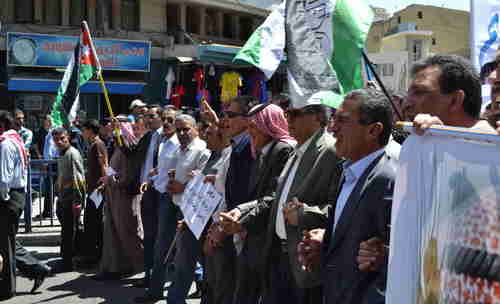 |
Last week, we reported that the U.S. announced the formal deployment of 200 troops to Jordan. The troops will be "ready for military action" if President Barack Obama were to order it. On Friday, Jordanians rallied against the deployment of the 200 U.S. forces in Jordan. Demonstrators also burned a mock American flag. At the end of the demonstration, they gather in a circle and danced, chanting about Ali Baba and the forty thieves. Al-Monitor
The question of the use of chemical weapons by the regime of Syria's president Bashar al-Assad continued to draw worldwide attention on Friday. President Barack Obama met with Jordan's King Abdullah II in the White House and said that "a line has been crossed" in Syria, and said, "To use weapons of mass destruction on civilian populations crosses another line in terms of international norms and laws. ... That's going to be a game changer." However, he declined to intervene militarily until a "vigorous investigation" had been completed, to find more "direct evidence."
However, Debka, which sometimes gets things wrong, is quoting its military intelligence sources as saying that the purpose of Obama's meeting with Abdullah is to firm up an agreement for the U.S. to deploy a 20,000 troop "surge" into Jordan. The 200 troops announced last week are to lay the groundwork for the main body to take up quarters in the King Hussein Air Base Mafraq, near the borders of Iraq and Syria. The purpose of the "surge" is to protect Jordan's royal family both from jihadists from Syria and from and "Arab Spring" type revolt -- a step that the Obama administration did not take with Tunisia, Libya, Egypt and Yemen. The "surge" will be heavily coordinated with Israeli forces, and buffer zones will be set up on Syria's borders to prevent attacks on both Jordan and Israel. This "surge" comes at a time when thousands of fighters from Iran-backed Shia militias from Iraq and Hezbollah are aiding the al-Assad regime forces, and are threatening to defeat the opposition rebels. The Hill and Debka
With thousands of fighters from Iran-backed Shia militias arriving in Syria to support al-Assad's regime, it's not surprising that thousands of Sunni jihadists are also arriving in Syria to fight the Shia militias. In particular, disaffected Muslims from Germany and elsewhere in Europe have been heading for Syria to receive training in weapons and terrorist techniques. German analysts are concerned that these fighters are gaining experience in Syria, and making contacts, and will return to Germany and conduct terrorist attacks there. Spiegel
(Comments: For reader comments, questions and discussion, see the 27-Apr-13 World View -- Obama's meeting with Jordan's Abdullah may signal new troop deployment thread of the Generational Dynamics forum. Comments may be
posted anonymously.)
(27-Apr-2013)
Permanent Link
Receive daily World View columns by e-mail
Donate to Generational Dynamics via PayPal
U.N. Security Council approves 12,600 person force for Mali
This morning's key headlines from GenerationalDynamics.com
 |
The Kaesong industrial park is in North Korea, just across the border from South Korea. It was created in 2004 as a point of cooperation between the two Koreas. Until a month ago, it provided jobs for more than 53,000 North Koreans, and over 1,000 South Koreans, many of whom cross the border each day to work there. The employers are South Korean manufacturing firms, mostly textiles. Each North Korean earns around $70 per month, though a larger amount is paid to the North Korean government, making Kaesong a major source of income.
Operations in Kaesong halted on April 9, when the North Koreans pulled out all 53,000 of its workers, as part of its circus-like daily threats of war. But now the South Koreans are saying that it's time to end the circus show, and demanding that the North "discuss ways of normalizing operations at Kaesong" by Friday. If the offer is rejected, then the South will take "serious measures," possibly shutting Kaesong down for good. Yonhap (Seoul)
The White House and top U.S. administration officials said on Thursday that U.S. intelligence has concluded "with some degree of varying confidence" that the Syrian government has twice used chemical weapons against the opposition. Republican Senator John McCain is insisting that President Barack Obama should now honor his commitment that use of chemical weapons would be a "game changer" and would cross a "red line" that would trigger military intervention in Syria. However, U.S. officials are now saying that more definitive proof was needed before there could be military action. One issue is that if the U.S. launched a military intervention based on intelligence estimates, then the announcement would be met with widespread scorn. AP
The ethnic violence between Uighurs and Han Chinese in China's Xinjiang province in northwestern China that we reported yesterday is being described by Chinese authorities as the acts of a small group of thugs. However, it seems far more likely that there two major underlying causes:
Chinese media are claiming that the United States holds a "double standard" when it comes to terrorism in the United States and in China. According to one Chinese professor:
"However, the West has been holding double standards in the definition of terrorism. If the East Turkestan separatists carry out evil deeds in Xinjiang, some Western opinions whitewash them as seeking 'national self-determination'"
The Chinese point out that the U.S. was quick to blame separatists from Chechnya for the Boston marathon bombings, but sympathizes with Uighur separatists who commit terrorism in Xinjiang. VOA and BBC
The United Nations Security Council on Thursday voted unanimously to approve a peacekeeping force for Mali, consisting of 11,200 troops and 1,440 police. Though the French-led intervention initially succeeded in driving the al-Qaeda linked militias from the towns and cities once under their control, a series of several attacks, including suicide bombings, in Mali's northern cities raise the question of whether the Islamist forces have really been defeated. CS Monitor
(Comments: For reader comments, questions and discussion, see the 26-Apr-13 World View -- U.S. says Syria has used chemical weapons twice thread of the Generational Dynamics forum. Comments may be
posted anonymously.)
(26-Apr-2013)
Permanent Link
Receive daily World View columns by e-mail
Donate to Generational Dynamics via PayPal
Syria's opposition scorns Obama over chemical weapons commitment
This morning's key headlines from GenerationalDynamics.com
 |
Major ethnic violence has returned to China's northwestern Xinjiang province for the first time since 2009. On Tuesday, 21 people were killed in confrontations between police and Uighur residents of Kashgar, the country's westernmost city. Violence exploded in July 2009 when over 1,000 people were injured in a Uighur riot that targeted Han Chinese. That riot was triggered by the Han Chinese killing of two Uighurs working in a toy factory in Guangdong province. (See "China's Xinjiang province is scene of violent anti-government protests")
The Muslim Uighurs, of Uzbek origin, have historically occupied the Xinjiang region. However, the Chinese Communist Party (CCP) government has been relocating Han Chinese into the Xinjiang region in order to dilute the Uighur population. However, the Han Chinese have marginalized the Uighurs, inflaming the situation. Few details are known about the new violence, since China keeps very tight control over all reporters who attempt cover the situation. LA Times and Xinhua
Well, here we go again. The North Koreans have continued to move more missile launchers to their east coast, apparently in preparation for a missile test that the west will say is "unacceptable," though do nothing else. The last best guess for when this missile test would be was Monday, April 15, the birthday of North Korea's founder Kim Il-sung. Well, nothing happened on April 15. So the new best guess is now, Thursday, April 25, the anniversary of a well-remembered battle with the Japanese. So, the new child dictator Kim Jong-un continues to keep the world guessing what he plans to do next, and apparently all we can do is wait to see when he makes his move. Global Post
Syria's opposition forces are expressing scorn at President Barack Obama for appearing to back down from earlier statements that the use of chemical weapons in Syria would be a "red line" or a "game changer" that would trigger military intervention in Syria. There have been reports from Israel, Britain and France of the use of chemical weapons in Syria, but the obvious reluctance of the U.S. administration to involve itself militarily in Syria is forcing the administration to hedge and duck questions about whether it means anything it says. The same is true about North Korea threats. The problem is that the U.S. is losing credibility. Guardian (London) and Global Post
(Comments: For reader comments, questions and discussion, see the 25-Apr-13 World View -- Ethnic violence kills 21 in China's Xinjiang province thread of the Generational Dynamics forum. Comments may be
posted anonymously.)
(25-Apr-2013)
Permanent Link
Receive daily World View columns by e-mail
Donate to Generational Dynamics via PayPal
Israel accuses Syria of using chemical weapons, then retracts
This morning's key headlines from GenerationalDynamics.com
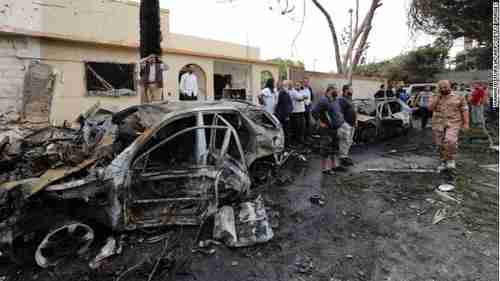 |
Two guards were wounded when a car bomb exploded early Tuesday morning in front of France's embassy in Tripoli, Libya. The explosion created a deep crater in the street, and destroyed two cars parked nearby, damaging nearby buildings. There were so few casualties because the blast occurred at 7:10 am local time, before most embassy personnel had arrived for work. There has been very little dependable security in Libya since the 2011 Nato war in Libya. The region of greatest insecurity has been around Benghazi, which has been hit by multiple bombings and assassinations. Four Americans, including ambassador Chris Stevens, were killed when heavily armed men overran the Benghazi mission on September 11th, setting fire to much of the compound and then attacking a nearby annex. The Benghazi attack remains highly controversial in Washington, since there's evidence that the Administration repeatedly lied and covered up the facts surrounding the attack. The Local/AFP (France) and CBS News
Brig. Gen. Itai Brun, the head of research and analysis in Israeli military intelligence, told a security conference on Tuesday that the regime of Syria's president Bashar al-Assad has used chemical weapons, including the lethal nerve agent sarin, multiple times:
"To the best of our professional understanding, the regime used lethal chemical weapons against the militants in a series of incidents over the past months, including the relatively famous incident of March 19. Shrunken pupils, foaming at the mouth and other signs indicate, in our view, that lethal chemical weapons were used."
However, US Secretary of State John Kerry said that he had spoken to Israel's prime minister Benjamin Netanyahu, who refused to confirm Brun's accusations.
The United States and the west are extremely reluctant to confirm the use of chemical weapons in Syria, since President Barack Obama has said that their use would cross a "red line," and require military intervention in Syria. AP and McClatchy
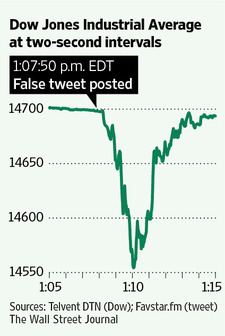 |
The Dow Jones Industrial Average briefly crashed 150 points on Tuesday at 1:08 pm, when someone hacked into the Associated Press Twitter account and posted a phony story saying that explosions at the White House had injured President Barack Obama. AP immediately retracted the story, and things were back to "normal" by 1:15 pm. The rapid crash was caused by computer algorithms that scan all news stories and react within nanoseconds when certain keywords are recognized. Credit for the AP hack was claimed by a shadowy group called the "Syrian Electronic Army." CNBC and NBC News
Japan's prime minister Shinzo Abe made the most threatening statement so far in the dispute with China over the Senkaku / Diaoyu islands:
"We would take decisive action against any attempt to enter territorial waters and to land. We would never allow [a landing].It would be natural for us to expel by force (the Chinese) if they were to make a landing."
China sent a fleet of eight warships to the waters around the islands, and forced boats carrying 80 Japanese nationalists to turn back.
Threats between Japan and China are back in the news again, after being eclipsed by other crises, including the Boston terror attack and the North Korean war threats. But tensions have remained very high. China refused to allow Japan to contribute humanitarian aid to victims of the recent earthquake in Sichuan province. And the Chinese are infuriated that 168 Japanese lawmakers on Tuesday visited the Yasukuni Shrine, which commemorates World War II war dead, including some who have been declared war criminals for atrocities committed against China. Japan Times and China Daily
(Comments: For reader comments, questions and discussion, see the 24-Apr-13 World View -- Japan's Shinzo Abe threatens 'force' against China's ships thread of the Generational Dynamics forum. Comments may be
posted anonymously.)
(24-Apr-2013)
Permanent Link
Receive daily World View columns by e-mail
Donate to Generational Dynamics via PayPal
Canada thwarts al-Qaeda inspired plan to attack passenger train
This morning's key headlines from GenerationalDynamics.com
 |
Russia's president Vladimir Putin warned his economic ministers on Monday of "alarming signals" of a slowing Russian economy, and demanded:
"I'm waiting for concrete proposals about measures that will help us ensure stable economic growth and safeguard ourselves against negative swings in the world economy, reduce the risks for key industries and stimulate business activity."
However, like politicians in Europe and America, Putin added that there's nothing to worry about:
"I do not want to dramatize the situation unnecessarily. The Russian economy has a sufficient safety net. Many analysts believe growth in the second-quarter is expected to recover."
I guess that even in Russia, prosperity is just around the corner. Russia Today and Bloomberg
The news that the Boston terrorist bombers are ethnically from Chechnya who have lived in the U.S. for many years may be shocking to Americans, but in Russia it's not so surprising, as they've been dealing with exactly the same situations for years. In fact, Americans who used to be sympathetic to the Chechens and blamed the Russians for the unrest are now doing an about-face and viewing Chechnya as a "cauldron of Islamic militancy." However, that reality has created an ironic problem for Russian officials, because the Boston terrorist connection to Chechnya is going to create bad publicity for the 2014 Winter Olympic Games to be held in Sochi in the North Caucasus, and also raises new questions about the stability of Russia's government. Russia Today and Jamestown
The Royal Canadian Mounted Police (RCMP) on Monday announced the arrest of two men planning a terrorist attack on a passenger train. The plan received "direction and guidance" from an element of al-Qaeda based in Iran, but there was no evidence that the plan was "state-sponsored" by Iran. Although details of the planned attack were not released by the RCMP, speculation is that they were planning to blow up a bridge as a train from New York to Toronto passed over it. The two men are from Tunisia and the United Arab Emirates, respectively. The planned attack is unrelated to the Boston bombings.
The startling element of this case is that it was inspired by al-Qaeda elements in Iran. Now, Sunni Muslim al-Qaeda and Shia Muslim Iran are bitter enemies. Al-Qaeda linked terrorists have conducted terrorist attacks on Iran, most spectacularly the 2009 attack by Jundallah that killed 42 people, including 20 top commanders in the Revolutionary Guards. (See "Furious Iran blames Pakistan, US and Britain for Sunday's terrorist attacks.")
Nonetheless, Iran and al-Qaeda have cooperated, especially in Afghanistan, against their common enemy, the United States. After 9/11/2001 and the start of the Afghan war, Iran transported several hundred al-Qaeda linked individuals to Iran, where al-Qaeda established its "management council," under the direction of Osama bin Laden. Iran has kept the group under strict house arrest, but allowed them to plot activities against the United States and others of Iran's enemies. Canadian TV News and Foreign Affairs (Jan 2012)
The Iran-supported Lebanese terrorist group Hezbollah is now openly fully engaged in fighting in the al-Qusair region of Homs province in Syria, alongside the army of Syria's president Bashar al-Assad. The actions of Iran-backed Hezbollah are being called a "declaration of war" by the rebel Syrian National Coalition, and Lebanese Salafists are calling for a jihad to defend Sunnis in Syria from Shia Hezbollah. According to Sheikh Ahmad Assir:
"We in Lebanon are today [caught] between the Zionist hammer and the anvil of Iran's party arms [Hezbollah], which have been directed internally. Therefore, every Muslim in Lebanon or abroad is duty-bound to respond to the [jihad] appeal and support the oppressed in Syria, particularly in Al-Qusair."
However, a Hezbollah official defended its actions, calling it a "moral duty":
"What Hezbollah is doing toward this issue is a national and moral duty in protecting the Lebanese in border villages. Are we required to leave our people in border villages exposed to killings, kidnapping, slaughter and displacement?"
The danger is that the war will spread into Lebanon and into other countries. Daily Star (Beirut)
(Comments: For reader comments, questions and discussion, see the 23-Apr-13 World View -- Boston bombers raise new problem for Russia's Vladimir Putin thread of the Generational Dynamics forum. Comments may be
posted anonymously.)
(23-Apr-2013)
Permanent Link
Receive daily World View columns by e-mail
Donate to Generational Dynamics via PayPal
Heavier fighting flares on the Syria / Lebanon border
This morning's key headlines from GenerationalDynamics.com
 |
North Korea continues to build up an arsenal of missile launchers along the east coast, apparently ready to launch missiles. In early April, the North Koreans moved two mid-range missiles and seven mobile missile launchers to the east coast. The speculation was that they would conduct missile tests on April 15, the 101st anniversary of the birth of North Korea's founder Kim Il-sung. However, it now turns out that launchers for two shorter-range Scud missiles were moved to the east coast in the last few days, and appears to be prepared to launch several missiles as a show of force. This would trigger a new international crisis, even if the missiles landed in water. And it would trigger military retaliation if any American, South Korean or Japanese assets were put at risk. America has threatened to shoot down any North Korean missile, and the North Koreans have responded by threatening war if that happens. Yonhap (Seoul)
The number of prisoners at Guantanamo prison taking part in a hunger strike has grown by 32 in just the last few days. 84 prisoners, over half of the 166, are now participating. Of those, 16 are now being force-fed, though no lives are in danger according to the Pentagon. The strike began on February 6, when the inmates claim that prison officials searched their Korans for contraband, and has been growing into a general hunger strike since then. AFP and Independent (London)
Comments by several economists indicate that the assumptions underlying the recent European bailout of Cyprus are unrealistic, which should not be a surprise to any regular readers.
According to Megan Greene, chief economist at Maverick Intelligence:
"The underlying growth assumptions for the Cypriot bailout this year are hugely overly optimistic. Senior members of the ministry of finance in Cyprus admitted to me that they'd be quite pleased if the Cypriot economy only contracted by around 9% this year. With GDP falling more sharply than expected, Cyprus will fall behind on its fiscal targets, and as it implements ever more austerity measures to play catch up, will go deeper into depression. This bailout program ensures Cyprus will either need a second bailout or a debt restructuring in a year or two, with the latter more likely."
Note that the assumption that Cyprus's economy would contract by 9% is "hugely overly optimistic." That's very unpleasant reading.
According to Stephanie Hare, senior analyst for Western Europe at Oxford Analytica, the assumptions for Ireland, Portugal and other troubled European economies are also optimistic:
"The viability of the latest Cypriot rescue is highly questionable: forecasts of a deep recession this year (nearly 9.0%) and in 2014 (nearly 4.0%) may prove optimistic, while the projection that Cyprus will return to growth thereafter is patently ridiculous. Other euro-area bailout recipients remain enmired in debt, high unemployment and recession -- one reason why EU leaders agreed last week to grant Ireland and Portugal an extra 7 years to pay back their bailout loans. Efforts by the EU/ECB/IMF 'troika' to be positive are requiring ever-increasing contortion, including the tolerance of fiscal slippage, extended loan maturities, and debt write-offs. Risks remain high (Portugal could still require further assistance and Slovenia remains vulnerable) while the lack of growth throughout the region augers poorly for its long-term prospects."
These analyses continue to be consistent with the Generational Dynamics prediction that the world is headed for a major panic and financial crisis. Kathimerini
Areas held by al-Qaeda linked Sunni Islamist rebels on both sides of the Syria/Lebanon border were attacked on Sunday by combined forces of Syria's president Bashar al-Assad, combined with Shia militias of Iran-backed Hezbollah. Saturday's attack was the first by Syrian forces deep inside Lebanon. The al-Qaeda linked al-Nusra Front in Syria threatened to "move the battle into Lebanon" if the Hezbollah backed offensive continues. Reuters
(Comments: For reader comments, questions and discussion, see the 22-Apr-13 World View -- Hunger strike at Guantanamo grows among prisoners thread of the Generational Dynamics forum. Comments may be
posted anonymously.)
(22-Apr-2013)
Permanent Link
Receive daily World View columns by e-mail
Donate to Generational Dynamics via PayPal
Krugman in 2002: The Fed should create a housing bubble
This morning's key headlines from GenerationalDynamics.com
 |
In yesterday's report, "20-Apr-13 World View -- Generational analysis of Boston Marathon bombings", I paraphrased the famous remark by Ambrose Bierce as "Terrorism is God's way of teaching geography to Americans." Well, apparently the problem is worse than I thought, and the education process has begun. Since the announcement that the two Boston Marathon bombers had origins in Chechnya, dozens of bloggers have been posting messages to Twitter and Facebook, accusing the Czechs of terrorism and even calling for US retaliation against the Czech Republic. Ambassador Petr Gandalovic has posted the following message on the web site for the Czech embassy in Washington:
"As many I was deeply shocked by the tragedy that occurred in Boston earlier this month. It was a stark reminder of the fact that any of us could be a victim of senseless violence anywhere at any moment.As more information on the origin of the alleged perpetrators is coming to light, I am concerned to note in the social media a most unfortunate misunderstanding in this respect. The Czech Republic and Chechnya are two very different entities - the Czech Republic is a Central European country; Chechnya is a part of the Russian Federation.
As the President of the Czech Republic Milos Zeman noted in his message to President Obama, the Czech Republic is an active and reliable partner of the United States in the fight against terrorism. We are determined to stand side by side with our allies in this respect, there is no doubt about that."
This isn't the first time that American bloggers needed education about geography. After the 2008 Russian invasion of the South Caucasus nation of Georgia, bloggers posted messages about Russia invading the U.S. state of Georgia. Ria Novosti and Czech Republic Embassy
In 2002, famous left-wing economics pundit Paul Krugman wrote a column in which he advocated that the Fed and the Bush administration take steps to create a housing bubble. His reasoning was that consumers would be able to refinance their houses and use the money to purchase things in shopping malls, which would improve the economy. So apparently Nobel-prize winning economist Paul Krugman specifically advocated policies that created the huge financial crisis that's still ongoing.
Today he's advocating the same kinds of policies -- create and spend trillions more dollars, and go into debt with no limits. Having been an intellectual force in creating one disaster, he's doing everything he can to convince the Fed and the Obama administration to create an even worse disaster.
Krugman is not someone that anyone would accuse of knowing anything about economics. But no matter. He had one important qualification -- his deep hatred of President Bush -- and that qualification was enough for the intellectuals in the Nobel Prize committee to award him the Nobel prize. Huffington Post
Among the ways that the deadly Hepatitis C virus spreads are using dirty drug needles, or by sharing the straws used to snort cocaine. The virus may do nothing for years after infection, and then attack the liver, causing life-threatening liver disease or liver cancer. The Hepatitis C virus is an inner-city and drug-user epidemic: Infection among IV drug users is estimated at 60 percent and in the prison population at about 50 percent. However, a startling new CDC study shows that there is a Hepatitis C epidemic in the making among the Boomer generation. During the 1960s, and especially during the 1967 "Summer of Love," many teen Boomers experimented with sex and drugs. Even one experiment with drugs can be enough to be infected with the virus, and now many of these Boomers are developing liver disease, requiring a liver transplant. According to one researcher:
"This is an iceberg problem. We see only a small part of the problem now -- the tip, those ill or needing liver transplants -- and that's very frightening. But probably 10 times that number have an underlying, smoldering disease and are asymptomatic. And most of these people are walking around without a clue they're infected."
Boomers are now considered to be a "high risk group" for Hepatitis C, and are encouraged to be screened for the virus. Health Day
(Comments: For reader comments, questions and discussion, see the 21-Apr-13 World View -- American bloggers confuse 'Chechnya' with 'Czech Republic' thread of the Generational Dynamics forum. Comments may be
posted anonymously.)
(21-Apr-2013)
Permanent Link
Receive daily World View columns by e-mail
Donate to Generational Dynamics via PayPal
The radicalization of Dzhokhar and Tamerlan Tsarnaev
This morning's key headlines from GenerationalDynamics.com
 |
The satirist Ambrose Bierce said a century ago, "War is God's way of teaching Americans geography." Bierce might have said the same of terrorism, because now Americans may finally have occasion to learn something about Chechnya (in the North Caucasus) and Kyrgyzstan (in Central Asia). Long-time readers of Generational Dynamics will already be familiar with these regions, as I've written about them many times, but for most Americans, they'll be completely unfamiliar.
Dzhokhar and Tamerlan Tsarnaev were ethnic Chechens (from Chechnya), but they were born in Kyrgyzstan. What were ethnic Chechens doing in Kyrgyzstan?
The two regions -- the North Caucasus (Dagestan, Chechnya, etc.) and central Asia (Kazakhstan, Kyrgyzstan, Tajikistan, Uzbekistan) -- are linked by history. The two regions are historically connected because Josef Stalin in 1944 deported North Caucasus ethnic groups to Central Asia, believing that they were collaborating with the Nazis. When Nikita Khrushchev allowed the deported people to return in the 1960s, many remained behind. Thus, familial relationships between the two regions remain to this day, and there has been cross-pollination of Islamist terrorist fighters in both regions.
According to interviews with the Tsarnaev brothers' relatives, including their father in Dagestan and their uncle in Baltimore, the family knew nothing about the brothers' plans, and were both shocked and saddened by the revelation that they were the perpetrators. Baltimore Sun and Russia Today
If we look back at the London subway bombers of 7/7/2005, it turned out that the suicide bombers were committing "altruistic suicide," because they believed that their parents' community would support and honor their actions. The Boston bombers were not suicide bombers, but I wouldn't be surprised if the they were acting for what they considered to be altruistic reasons, expecting to be honored by their parents.
The London subway bombers were radicalized by internet contact with al-Qaeda imams in the Pakistan tribal areas. As I recall, there were some visits to Pakistan by one or two of the London bombers.
It appears that the Boston bombers were radicalized through social networks. Tamerlan apparently spent around six months of last year out of the U.S., during which time he visited his father in Dagestan, and visited relatives in Chechnya. It's possible that Tamerlan arranged for some training during that six month period, with or without the knowledge of his father. NBC News and Jamestown
Kyrgyzstan's last generational crisis war was the brutally repressed 1916 rebellion against the Russians, after which Kyrgyzstan became part of the Soviet empire. World War II was an generational Awakening era war for Kyrgyzstan. So, from the point of view of Generational Dynamics, Kyrgyzstan today is in a "fifth turning," a distinctly different era that occurs if the entire generational Crisis era (fourth turning) passes with no crisis war. (See "Basics of Generational Dynamics")
Within Kyrgyzstan, there are many pending conflicts that may have contributed to the radicalization of the Tsarnaev brothers.
So what we're trying to do here is identify possible reasons why the Tsarnaev brothers, growing up in Kyrgyzstan, were radicalized against the U.S., and why they eventually decided that bombing the Boston Marathon would be an altruistic act that would make their parents proud of them. We've identified several possibilities:
These appear to be the most likely motivations for the Boston Marathon bombers.
It's important to emphasize the obvious: None of this is supposed to imply logical or rational reasoning on the part of Tsarnaev brothers. But it's not crazy either. It's no different than the recent massacre of Muslims by Buddhists in Burma, or by slaughter of Sufis and Shias by Sunni radicals in Pakistan, or by the genocide of Jews by ordinary Germans in the 1930s, or by the massive fraud by financial engineers in the early 2000s that caused the financial crisis. (See "The Legacy of World War I and the Holocaust") As I've described at length many times, these things occur when inter-generational hatreds metastasize into hatred along fault lines defined by religion, ethnicity, geography, language, or skin color. As time goes on, we'll probably learn a lot more about the specific motivations of the Tsarnaev brothers.
Whatever the motives of the Tsarnaev brothers, it's still necessary for the investigation to determine exactly what methodology was used to radicalize them. Did they figure out how to build a bomb on their own, following directions from the internet, or through online contacts? Or were they part of a larger cell that's still out there, building more bombs? These questions will presumably be answered in the coming days. Guardian (London)
This analysis of the Boston Marathon bombings gives me an opportunity to review the extremely shameful news coverage by ABC News in 2005.
One change that the Boston Marathon bombings may have brought to America is a new appreciation for the horrific terrorist attacks that the Russians have suffered at the hands of Islamic terrorists from the North Caucasus.
In September, 2004, Russia was the target of several major terrorist attacks -- the bombing of two airplanes in flight, a subway bombing in Moscow, and the massacre of 340 people, including 156 children, at a school in Beslan, North Ossetia. (See "Russian President Putin asks revenge for Beslan")
All of these terrorist attacks occurred in a ten-day period, and were comparable in size and horror to America's 9/11 attacks, but the Russians received no sympathy from Americans. To the contrary, some American leaders blamed the terrorist attacks on the Russian government, saying that it had been mistreating the Chechens.
As if to prove the point, in July 2005, ABC News broadcast a lengthy interview of Shamil Basayev, the mastermind of the Beslan massacre and other terrorist acts. Basayev was permitted to go on and on, justifying his bloody massacres politically. It's as if ABC News had broadcast a lengthy interview with Osama bin Laden, allowing him to go on and on criticizing the U.S. and saying that we deserved the 9/11 attacks.
This was completely irresponsible "journalism" on the part of ABC News, and the Russians were quite angry. (See "Russia infuriated over ABC 'Nightline' interview of Shamil Basayev".)
Returning now to the paraphrase of Ambrose Bierce's quote, "Terrorism is God's way of teaching geography to Americans," perhaps now Americans will learn where the North Caucasus is, and ABC News will learn to be less contemptuous of terrorism originating there. The Atlantic Wire
(Comments: For reader comments, questions and discussion, see the 20-Apr-13 World View -- Generational analysis of Boston Marathon bombings thread of the Generational Dynamics forum. Comments may be
posted anonymously.)
(20-Apr-2013)
Permanent Link
Receive daily World View columns by e-mail
Donate to Generational Dynamics via PayPal
Racial hatred suspected in shooting of Bangladeshis in Greece
This morning's key headlines from GenerationalDynamics.com
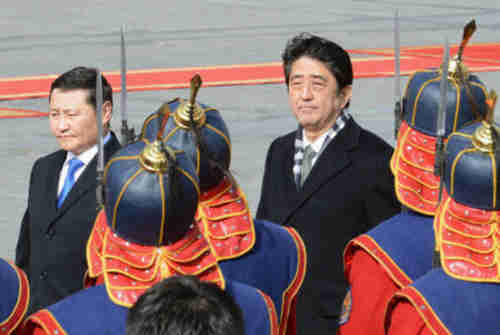 |
The purpose of the recent visit by Japan's prime minister Shinzo Abe to Mongolia is to counter China's increasing influence in Mongolia and other parts of Asia. Mongolia has large deposits of coal, copper, gold and uranium, and is also believed to be rich in rare metals and rare earths. But Japan is racing with Chinese firms that are stepping up efforts to acquire firms controlling Mongolian mines, giving China effective control over these mines. Abe's meetings with Mongolia's prime minister Norov Altankhuyag in Ulaanbaatar (Ulan Bator), the capital of Mongolia, had these purposes:
According to Mongolia's president Tsakhia Elbegdorj, "It has been said many times that with Mongolia's wealthy resources and Japan's hi-tech, we can develop complementary cooperation, and now is the time [for this] to be realized." However, speculation is that Mongolia and Japan are developing a trilateral framework, along with the United States, to counter China's influence.
Altankhuyag also promised to assist in easing tensions between North and South Korea, as Mongolia has a normal relationship with North Korea. Jamestown and Japan Times
About 30 migrant workers, mostly from Bangladesh, were wounded in a shooting on a strawberry farm in Nea Manolada, a village east of Athens, in Greece. According to a spokesman for the migrants, more than 150 Bangladeshis were working on the farm and had not been paid in six months. The workers began a strike three days ago. The owner called them in, promising payment, and then he and some foremen opened fire on the workers. The incident has outraged many Greeks fearing racial hatred and violence, and even the neo-Nazi Golden Dawn party condemned the barbaric shooting. Police are searching for three foremen to be charged with attempted manslaughter. Kathimerini (Athens) and BDnews24 (Bangladesh)
The neo-Nazi party Chrysi Avgi, or Golden Dawn, has been gaining supporters in Greece as the financial crisis has deepened. Polls show that the party holds 10-12% of voter support, up from almost zero in 2009. At a recent rally of over 1,000 neo-Nazis, party leader Nikos Michaloliakos, 55, bellowed: "No one can stop us -- not the bombs, not all your filth. We will triumph!" His listeners raised their right arms and yelled "Zito!," a phrase meant to sound like "Heil!" In parts of Athens where migrants live, small bands of extremists calling themselves "stormtroopers" roam the streets and beat foreigners and leftists with clubs, baseball bats and knives. Michaloliakos himself is a Holocaust denier, and says that Adolf Hitler is "A historic figure, who is not judged objectively." Spiegel
(Comments: For reader comments, questions and discussion, see the 19-Apr-13 World View -- Japan and Mongolia cooperate to counter China's influence thread of the Generational Dynamics forum. Comments may be
posted anonymously.)
(19-Apr-2013)
Permanent Link
Receive daily World View columns by e-mail
Donate to Generational Dynamics via PayPal
IMF: Loose U.S. monetary policy risks global financial stability
This morning's key headlines from GenerationalDynamics.com
 |
Following the razor-thin victory by Nicolas Maduro in Sunday's presidential election in Venezuela, a series of opposition-led protests have resulted in seven deaths. When the late Hugo Chavez ran in last year's presidential election, he beat opposition leader Henrique Capriles by 20%. Maduro had hoped to beat Capriles by a similar margin in this year's runoff election, following the death of Chavez, but instead he won by only 1.5%. Capriles has requested a full recount of Sunday's votes. Maduro at first agreed, and later refused, further infuriating the opposition. Maduro is now banning any further protests, and is calling the protesters "Nazis," who are following a script written by the United States, which he says is planning a coup against him. Maduro does not have anything like Chavez's charisma, and the fear is that the close election will be the trigger for continued violence between the two ideological camps. Venezuelanalysis and Al-Jazeera
According to the International Monetary Fund (IMF) Global Financial Stability Report, issued on Wednesday, loose monetary policy in the U.S. has encouraged weaker standards for corporate underwriting while company debt continues to grow, posing a risk to financial stability. In other words, corporations are taking the same risks that they took in mid-2000s decade, in the lead up to the financial crisis. Concerning Europe, the report says that the debt levels at banks in Portugal, Ireland, Italy, Greece, Spain and Cyprus (PIIGS + Cyprus) are unsustainable. Reuters and International Monetary Fund
China has issued a new white paper, "The Diversified Employment of China's Armed Forces," describing the duties of the People's Liberation Army (PLA), including the army, navy and air force, as well as the "Second Artillery Force (PLASAF)," responsible for carrying out nuclear counterattacks and precision strikes with conventional missiles. According to the paper, the PLA has evolved from purely defensive capabilities to offensive capabilities as well, although the paper insists, "We will not attack unless we are attacked; but we will surely counterattack if attacked." The paper says that China has signed border cooperation agreements with seven neighboring countries, including Vietnam, but doesn't mention the PLA policy of using its vast military power to take control of the entire South China Sea, including regions that have historically belonged to Vietnam and other countries. The white paper also doesn't mention that China has already effectively declared cyber war with the United States. Council on Foreign Relations and Xinhua
The U.S. has informally had special forces in Jordan for the last year, assisting the Jordanian forces. On Wednesday, the U.S. announced that it would create a more official military presence in Jordan -- the first formalized ongoing presence of an American military unit in Jordan for many years -- deploying 200 troops to the country. The troops will be "ready for military action" if president Barack Obama were to order it. The announcement comes as Syria's president Bashar al-Assad warned the government of Jordan that it was risking war within its own borders by hosting training camps for Syrian rebels, with U.S. help. He said he hoped that Jordanian officials realized "that the fire does not stop at our borders and everyone knows that Jordan is exposed to it as is Syria." CNN and LA Times
(Comments: For reader comments, questions and discussion, see the 18-Apr-13 World View -- U.S. sends more troops to Jordan after threat from Syria thread of the Generational Dynamics forum. Comments may be
posted anonymously.)
(18-Apr-2013)
Permanent Link
Receive daily World View columns by e-mail
Donate to Generational Dynamics via PayPal
Greece to lay off old people, hire 'young, capable' replacements
This morning's key headlines from GenerationalDynamics.com
 |
Greece's prime minister Antonis Samaras has confirmed that the latest deal with the "troika" of organizations bailing out Greece -- the European Commission (EC), the European Central Bank (ECB) and the International Monetary Fund (IMF) -- calls for 15,000 layoffs of civil service employees. There will be 4,000 layoffs in 2013, and 11,000 more layoffs in 2014, violating the provision in Greece's 1911 constitution that civil servants have lifelong job security.
Ordinarily this news story wouldn't be that big a deal -- just describing one more Greek commitment that probably won't be met. But here are the two paragraphs in the news story that made my eyes bulge:
"The premier also confirmed that a total of 15,000 civil servants would be dismissed before the end of 2014, with 4,000 to go this year, but he stressed that each departure would be replaced by a new recruit. 'The same number of new people will be recruited in their place,' he said.Poul Thomsen, the head of the International Monetary Fund’s mission to Greece, struck a similar note at a conference in Athens organized by The Economist, saying that public sector staff 'will not be eliminated but replaced by young, capable people.' He did not confirm explicitly that the one-hiring-to-one-firing ratio would apply."
Huh? Are we really being that explicit about tossing out the older generation to make way for the "younger, more capable" generations? I guess we are. Kathimerini
In yesterday's column, "16-Apr-13 World View -- Forced selling hits gold, commodities and stocks", I described how the 1929 crash was not caused by an emotional panic, but was caused by forced selling -- a cycle of margin calls, forcing investors to sell, pushing down prices, causing more margin calls.
There's a commercial from Interactive Brokers that seems to run a zillion times a day. The announcer says the following:
"Central banks are flooding the world with cheap money.Interactive Brokers will lend USD 1 million at 1.3% for every USD 200,000 in a portfolio margin account.
See our high dividend scanner for the many hundreds of stocks that yield over 5%.
Trading on margin is only for sophisticated investors with high risk tolerance. Dividend yields can change and stocks may lose value. You may lose more than your initial investment."
YouTube - Interactive Brokers commercial
And so, if you're in the 99%, then you can't borrow any money at all, certainly not for anything so mundane as paying salaries or buying equipment to build a business. That's why all these trillions of dollars pouring out of the Fed and other central banks don't cause hyperinflation.
But if you're in the 1%, then you can borrow millions of dollars from Interactive Brokers at 1.3% and use the money to buy stocks (and, presumably, gold) at only 20% margin. The stocks are supposed to yield over 5%. Sounds like a good deal.
From 1926 to 1929, the amount of margin credit grew from $2.5 billion to almost $10 billion. After the 1929 crash, the amount of margin debt fell, along with the stock market. Even as late as 1959, margin debt was only $3.4 billion.
Margin debt in 1990 was about $30 billion. It started taking off rapidly in the 1990s, at the same time as the tech bubble. Today, margin debt is $366 billion. It was $289 billion just one year ago. The reason that it grew so rapidly in the last year is because the Fed is "printing" $86 billion per month in new money liquidity, and a lot of that money is being loaned to investors by companies like Interactive Brokers, creating huge margin debt accounts.
John Kenneth Galbraith, in his 1954 book The Great Crash - 1929, defines margin as follows:
"Margins -- the cash which the speculator must supply in addition to the securities to protect the loan and which he must augment if the value of the collateral securities should fall and so lower the protection they provide -- are effortlessly calculated and watched. The interest rate moves quickly and easily to keep the supply of funds adjusted to the demand. Wall Street, however has never been able to express its pride in these arrangements. They are admirable and even wonderful only in relation to the purpose they serve. The purpose is to accommodate the speculator and facilitate speculation. But the purposes cannot be admitted. If Wall Street confessed this purpose, many thousands of moral men and women would have no choice but to condemn it for nurturing an evil thing and call for reform. Margin trading must be defended not on the grounds that it efficiently and ingeniously assists the speculator, but that it encourages the extra trading which changes a thin and anemic market into a thick and healthy one. At best this is a dull by-product and a dubious one. Wall Street, in these matters, is like a lovely and accomplished woman who must wear black cotton stockings, heavy woolen underwear, and parade her knowledge as a cook because, unhappily, her supreme accomplishment is as a harlot."
This shows the problem that the Fed faces. The Fed has created a true Ponzi scheme, where more and more money has to pour into the system to keep stock prices up. If the Fed lets up on the $86 billion per month, then customers of Interactive Brokers and similar firms who are counting on new stock market highs are going to be stuck. Once stocks start falling, and the margin calls start, then there's nothing to prevent a major panic and financial crisis. And that's exactly what Generational Dynamics predicts is going to happen.
New York Stock Exchange Market Data Factbook
Zhang Ke, a senior Chinese auditor, and head of leading Chinese accounting firm ShineWing, is refusing to sign off on further bond sales by local governments in China because local government debt is "out of control," and could spark a bigger financial crisis than the US housing market crash, according to Zhang
"We audited some local government bond issues and found them very dangerous, so we pulled out. Most don't have strong debt servicing abilities. Things could become very serious."
It is rare for a figure as established in the Chinese financial industry to make such stark comments. FT Blog
Germany's council of economic experts, known as the "Five Wise Men," is considering a plan to raise bailout money by large increases in real estate taxes on property. The Europeans have been looking for ways to fund bailout programs, and in Cyprus it was done by confiscating 60% of bank accounts above 100,000 euros. But many consider that unsatisfactory, because rich people can easily transfer their money out of a country when it appears that the country is headed for a bailout. However, rich people cannot transfer real estate out of a country, and so taxing real estate seems the best way to make the rich pay.
The idea of a wealth tax has gained support after publication last week of the European Central Bank (ECB) report that found that Germany had the lowest median net household wealth in the eurozone, while countries like Cyprus and Spain had much higher values. ( "11-Apr-13 World View -- Is Germany the poorest country in Europe?") The non-intuitive result is attributed to the fact that Germany has much lower home ownership than other countries, and home ownership is the biggest contributor to household wealth. Telegraph (London)
(Comments: For reader comments, questions and discussion, see the 17-Apr-13 World View -- Germany's economic experts consider a wealth tax to fund bailouts thread of the Generational Dynamics forum. Comments may be
posted anonymously.)
(17-Apr-2013)
Permanent Link
Receive daily World View columns by e-mail
Donate to Generational Dynamics via PayPal
Terrorist attack at finish line of Boston Marathon
This morning's key headlines from GenerationalDynamics.com
 |
At 2:50 pm on Monday, terrorist explosions in Boston, about two miles from where I live, killed three people and injured dozens more.
This is the first terrorist explosion on American soil since 9/11. The American public is already extremely anxious about a number of things, and this attack has the potential to harden opinions. The attacker might be an American on the left or right, or it might be a Muslim, or it might be a foreigner (Latino, Chinese, Canadian, or whatever) or it might be a disgruntled worker of some kind. Each possibility will drive a different path in public opinion, and may unite or further divide the American people. CNN
The price of gold as a commodity fell 9.3% to $1,362 per ounce on Monday, after falling 5% on Friday. Analysts are afraid that the price of gold is in free fall. According to one analyst, Phoenix Futures President Kevin Grady:
"I think the last $20 has been margin selling. The market is falling like a knife. People are saying, 'Get me out now.' You're also seeing people selling energy profits to pay for metals losses. You're seeing a tremendous amount of gold liquidation today."
It was just a couple of years ago that the price of gold was at $2,000 per ounce, and I had listen to "experts" endlessly talk about how it was going to continue going up, up, up, to $5,000 or even $10,000 per ounce.
Actually, as I've been saying for years, the long-term trend price of gold is around $400-500 per ounce, and gold has been in a bubble since the early 2000s. When the bubble bursts, the price of gold will overshoot the trend, and may fall to the $200-300 per ounce level. Whether that's what's happening now will not be known for a few days or weeks, but it will happen at some point. And people who insist on buying or holding gold are going to lose a lot of money.
The analyst quote above is worth study because it contains a number of important elements. Notice the reference to margin selling, and to the fact that energy investments are being sold to make up for losses in gold.
In a sense, the phrase "panic selling" isn't really accurate, because it implies a kind of insanity. But the insanity isn't in selling -- it's in buying. It was insanity for people to buy gold when the price was near $2,000. It was insanity for people to buy homes six years ago, when home prices had tripled or quadrupled. It's insanity for people to be buying stocks today, when the S&P 500 Price/Earnings ratio (stock valuations) has been far above average for over 15 years.
When the bubble bursts, the selling occurs, but because of necessity, not because of insanity. So it should be called "forced selling," rather than "panic selling." It's well to remember how the crash of 1929 occurred.
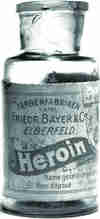 |
In 1929, it wasn't because people suddenly lost their minds, snorted heroin, and decided to sell everything on a whim. Typically, people had purchased stocks on margin -- had arranged with their brokers to buy stocks for only 10% of the purchase price, in essence borrowing the other 90% of the funds from the broker, who holds the stock as collateral. When the price of the stock begins to fall, then the brokers start calling their clients with "margin calls," which means you'll lose your stocks unless to put up more money. In order to meet margin calls, many investors have to sell other stocks, pushing those prices down. The result of this forced selling is a cascade effect, as margin calls force prices down, which results in more margin calls.
So, according to Grady, that's what happened on Monday with gold. People had purchased gold on margin, and when the price began to fall, they were forced to sell their gold, stocks and other commodities to meet margin calls. If this continues, then there will be a new cascade, and the crash will occur now instead of later. Or perhaps the Fed and other central banks can find a way to intervene and stop the fall, as it's been doing for years.
And that segues to the massive quantitative easing that's been going on. The Federal Reserve has been "printing" an enormous $86 billion per month and pushing it into the banking system through quantitative easing. The European Central Bank (ECB) has been pouring out billions through various bailout programs. But that's nothing compared to what the Bank of Japan is doing. The BOJ is also "printing" $81 billion per month in quantitative easing. But since Japan's economy is 1/3 the size of the U.S. economy, that would be like the U.S. "printing" $250 billion per month, or $3 trillion per year.
With trillions of dollars in new money pouring into the banking system, you'd think that we'd have hyperinflation, but we don't. I've been saying since 2003 that we're in a deflationary spiral, and that hyperinflation is impossible. The "experts" have been predicting "hyperinflation next quarter" continuously. They've been consistently wrong, and I've been consistently right.
This morning on CNBC, market reporter Rick Santelli was talking about the fall in gold prices, and he was asked about deflation. This really set him off, and he started screaming at the top of his lungs:
 |
"You know what? I'll tell you what. The more I hear about deflation, the more I just wanna pull my eyelashes out. Deflation is gonna cause central bankers to go, ohhhhh we gotta do more to fight deflation. I think it's deleveraging of assets that have gotten bubblicious, through cheap money, and the things central banks look at that were deflation, and they come back and do more of it just shows the LUNACY of what central banks have done to "save our lives." Even gold goes up when you have inflated dollars, and it goes down when you have to pay for it."
Well, Santelli may not like talk of deflation, but that's what we've got. But he's right that the massive outpouring of central bank money has created bubbles in commodities and stocks through debt, and now that debt is being deleveraged through forced selling, forcing prices down.
What's the motivation for all this talk about hyperinflation? My observation is that it's all wishful thinking. People on the left want to see hyperinflation because they want to see the $17 trillion government debt get inflated away. People on Wall Street want to see hyperinflation because they want to convince people to buy stocks. People on the right want to see hyperinflation because they want to sell gold. Deflation is a disaster for all of them, so they'd rather just go into a state of denial.
But from the point of view of Generational Dynamics, inflation does not occur in generational Crisis eras (except for brand new currencies). The famous German Weimar hyperinflation occurred during a generational Unraveling era. Enormous inflation occurred in America from 1977 to 1980, but that was during a generational Awakening era. During the Great Depression and WW II, one country after another suffered deflation, not inflation. You would think that there would be at least one major case of hyperinflation during that period, if only by accident, but apparently there was none. Hyperinflation does not occur during generational Crisis eras. We're in a deflationary spiral, and we're going to stay there.
So we have trillions of dollars in money pouring out of the central banks. Where is it going, and why isn't it causing hyperinflation?
Back in 2003, I received a call from an officer at my bank. She offered to loan me $25,000 because I was such a good long-time customer of the bank. No collateral, low interest rate. Her motivation, of course, is that she gets a commission.
Well, today those things don't happen any more, at least not to me and you, Dear Reader. Those of us in the 99% don't see a dollar of those trillions of dollars. Instead, that money is loaned to the people in the 1%, the people who don't need it, but borrow it anyway, at near zero interest rates, to invest in gold or commodities or stocks. That doesn't cause inflation.
Well, now it looks like that poop is hitting the fan. All those people in the 1% are in debt up to their eyeballs, and suddenly they're getting margin calls. They're forced to sell, which pushes down prices. That causes deflation. Let's see if Ben Bernanke can get us out of this one. CNBC
There was a lot of bad economic news on Monday, contributing to the fall in gold, commodity and stock prices:
(Comments: For reader comments, questions and discussion, see the 16-Apr-13 World View -- Forced selling hits gold, commodities and stocks thread of the Generational Dynamics forum. Comments may be
posted anonymously.)
(16-Apr-2013)
Permanent Link
Receive daily World View columns by e-mail
Donate to Generational Dynamics via PayPal
Cyprus offers citizenship to wealthy Russian oligarchs
This morning's key headlines from GenerationalDynamics.com
 |
Israel apologized last month for the deaths of nine Turkish citizens on May 31, 2010, in a confrontation between Israel's navy and the boat Mavi Marmara in a flotilla headed for Gaza in violation of Israel's Gaza blockade. However, still to be settled is the question of how much money Israel is going to have to pay to the families of the nine victims. Rumors are that Israel will offer $100,000 for each victim. Talks will begin next week, and they're not expected to be easy. According to a Turkish diplomatic source:
"Israel should perfectly know that this is not a process of bargaining. Compensation talks should not be turned into horse trading or dirty bargaining. We want to solve this issue in next week's talks."
Turkey's prime minister Recep Tayyip Erdogan is maintaining a hard line against Israel despite the apology. He announced on Sunday that he will stick to his plan to visit Gaza in May, and he insisted that Turkey will not send an ambassador to Israel unless Israel lifts the blockade of Gaza.
Israel apologized to Turkey last month because of the encouragement of American president Barack Obama during his visit last month, because he wanted Turkey and Israel to cooperate on issues involving Syria and Iran. Hurriyet (Ankara) and Zaman (Istanbul)
The resignation of Palestinian Prime Minister Salaam Fayyad is being described by analysts as a major blow to the Obama administration's plans to revive the "peace process," especially since Secretary of State John Kerry met with Fayyad in Ramallah two weeks ago, and asked him NOT to resign. I can't imagine what those analysts are talking about, since the "peace process" has been dead as a door nail for years, and is less likely to be revived than Hugo Chavez.
Salaam Fayyad was educated in the U.S. as an economist, and he's worked for World Bank and the International Monetary Fund (IMF). He's credited with developing the financial stability required for the creation of the state of Palestine, but he's also been heavily criticized because of the weakening Palestinian economy in the West Bank.
His resignation is said to be the result of bitter disagreements with Palestinian president Mahmoud Abbas. Fayyad is also extremely disliked by the leaders of Hamas, who accuse him of being dupes for Israel, despite his many denunciations of Israeli settlements in the West Bank. AFP and Bloomberg
In an attempt to save its financial services industry (called an "illegal tax haven" industry by some), Cyprus is looking for ways to attract investors again. And it's offering fast-track Cyprus citizenship to any foreigner who lost 3 million euros or more as a result of the 60% confiscation of depositors' accounts. And with Cyprus citizenship automatically comes European Union citizenship. It's hoped that the offer will be particularly appealing to Russian oligarchs who lost a lot of money in the bailout confiscation, and that they'll be tempted to try again. Cyprus has run a "citizenship by investment" program for years, open to any foreigner who invests 10 million euros in Cyprus, but now those requirements are going to be reduced considerably. Russia Today and Reuters
Monday, April 15, is the birthday of North Korea's founder Kim Il-sung, and all eyes are on North Korea to see what it will do to celebrate. South Korean intelligence says the North has had two medium-range missiles primed and ready to fire for nearly a week, and many observers believe that Monday will be the likely launch date. AP
(Comments: For reader comments, questions and discussion, see the 15-Apr-13 World View -- Turkey warns Israel against 'dirty bargaining' over flotilla compensation thread of the Generational Dynamics forum. Comments may be
posted anonymously.)
(15-Apr-2013)
Permanent Link
Receive daily World View columns by e-mail
Donate to Generational Dynamics via PayPal
Tensions rise in Greece over German war reparations
This morning's key headlines from GenerationalDynamics.com
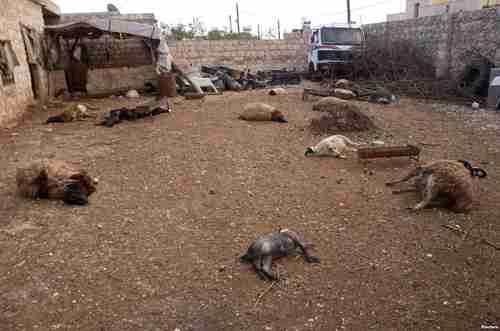 |
British military scientists have found forensic evidence that chemical weapons were used in the conflict in Syria. Analysis of a soil sample smuggled out of Syria proved a chemical weapon has been used, although the analysis could not determine whether the weapon was fired by Syrian government forces or rebels. VOA and Jerusalem Post
A German man was arrested in Athens, Greece, on Friday for allegedly trying to smuggle nearly half a ton of gold and silver, as well as 300,000 euros cash, out of Greece, and take it all back to Germany. The suspect was preparing to board a Lufthansa flight for Germany.
The timing of this incident is sensitive, because it comes as some Greek officials are claiming that Germany owes Greece some billions of euros in World War II war reparations. The reparations are for personal injury and infrastructure damage during the war, as well as repayment for loans that Greece was forced to make to the Nazis in 1942-44. Germany's Finance Minister Wolfgang Schaeuble is rejecting the Greek claims:
"I deem that such statements are irresponsible. Instead of misleading the people in Greece it would be better to show them the road to reform. ...The issue was settled a long time ago. Paying reparations is out of the question."
Tension is rising over this issue as eurozone finance ministers are having an emergency meeting in Brussels to negotiate the terms of the next bailout payment for Greece, another 10 billion euro loan. The major disagreement is over the number of civil service employees that Greece will have to lay off to qualify for the payment. BBC and Kathimerini and Euronews
Experts who read tea leaves to try to figure out what the North Koreans are going to do are pointing to a sign that might mean that North Korea's child dictator Kim Jong-un is backing down from the hysterical series of threats that he's used to fill the world news over the last few days. According to South Korean intelligence sources, the North Koreans have stopped moving their mobile missile launchers, and haven't moved them for two whole days. The tea leaf readers are taking this as a hopeful sign that the North Koreans are not planning a missile launch on Monday after all. Other experts are saying that it's only a matter of time before the North Koreans put a nuclear weapon on a missile and launch it. Yonhap (Seoul)
(Comments: For reader comments, questions and discussion, see the 14-Apr-13 World View -- British scientists say that chemical weapons were used in Syria thread of the Generational Dynamics forum. Comments may be
posted anonymously.)
(14-Apr-2013)
Permanent Link
Receive daily World View columns by e-mail
Donate to Generational Dynamics via PayPal
Cyprus residents in shock over new bailout terms
This morning's key headlines from GenerationalDynamics.com
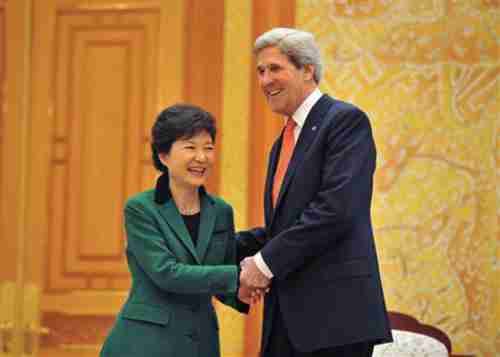 |
Here's what American Secretary of State John Kerry said on Friday during a visit to Seoul, Korea:
"We are all united in the fact that North Korea will not be accepted as a nuclear power. The rhetoric that we're hearing from North Korea is simply unacceptable."
What is this supposed to mean? North Korea is already a nuclear power, and has been for several years. So if that's not going to "be accepted," does that mean that we're going to bomb North Korea's nuclear facilities? What else could it possibly mean?
And what does it mean that the rhetoric "is simply unacceptable"? Does that mean that we're going to bomb North Korea's child dictator Kim Jong-un, the next time he opens his mouth? What else could it mean?
The U.S. has been calling North Korea's actions and rhetoric "unacceptable" for years, so much so that saying it again is just a joke. It's the same thing as in Syria -- the U.S. has said over and over again for two years that president Bashar al-Assad's bloody slaughter of innocent Syrian women and child is "unacceptable," but he just keeps going on slaughtering innocent women and children. Once again, these statements are silly jokes.
Kerry added the following:
"If Kim Jong-un decides to launch a missile, whether it's across the Sea of Japan or some other direction, he will be choosing willfully to ignore the entire international community. And it will be a provocation and unwanted act that will raise people's temperatures.I would say ahead of time that it is a huge mistake for him to choose to do that because it will further isolate his country and further isolate his people, who frankly are desperate for food, not missile launches."
So, why would a missile test be a "huge mistake"? Does anyone really believe that the North Koreans give a shit if they're "further isolated"?
It's thought to be likely that the North Koreans will conduct a missile test on Monday, April 15, the birthday of North Korea's founder, Kim Il-sung. The assumption is further that the missile test will not target Japan, South Korea or the U.S., but will land in the ocean.
Question: In that scenario, should the U.S. try to shoot it down, given that Kerry is saying that a missile test would be a "huge mistake"?
So, the next few days ought to be fun. CBS News
Residents of Cyprus are wondering how things could possibly get any worse, now that the size of the bailout has risen from 17.5 billion euros to 23 billion, requiring Cyprus itself to contribute 13 billion euros, rather than 7.5 billion. The government of Cyprus is blaming the increase on the number of people who withdrew billions of euros in advance of the bailout agreement, because they foresaw what might happen (or, as some have said, because they were warned). Of course, those people are thanking their lucky stars that they got their money out before the 60% confiscation was imposed. But now the Cypriots are trying to figure out where they're going to get the addition 5.5 billion euro contribution that they have to make to the bailout. Supposedly it will be done by raising taxes and selling off state assets, but things are still up in the air.
Meanwhile the Germans are showing no sympathy at all, and are certainly not willing to increase their own contribution to the Cyprus bailout. In fact, just the opposite is true -- some German politicians are saying that the 5.5 billion euro increase proves that there's no point in bailing out Cyprus at all, since the money would just go to waste. Germany's parliament, the Bundestag, will vote next week whether to approve the terms of the Cyprus bailout, and the proposal is expected to pass, provided that Cyprus can prove that it will be able to come up with the extra 5.5 billion. Cyprus Mail and Spiegel
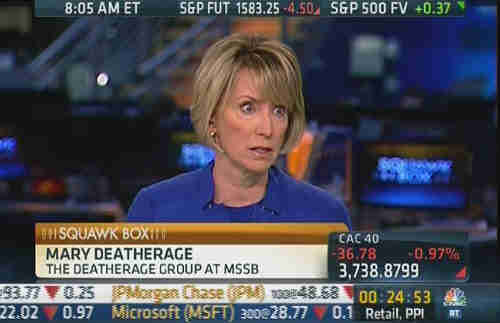 |
I never cease to be absolutely astonished at how "experts" come on to CNBC and tell open-mouthed lies to support their sales pitch, with no corrections from the anchors. They simply make up any numbers they want, and nobody says a word.
On Friday morning, I listened to Morgan Stanley's Mary Deatherage, head of The Deatherage Group, described as a Wealth Advisor and Senior Investment Management Consultant.
Deatherage was asked whether the stock market would go up from here. She said:
"Well look, under no circumstances could we ever say that the market's frothy. The trailing price/earnings for the S&P are 14.9 with a 2% yield. ... So nobody could say that it's overvalued. So the question is: Does it go strong from here?"
No, the trailing S&P 500 price/earnings ratio is not 14.9. She simply made that number up out of thin air. The S&P 500 P/E ratio is 18.28 as of April 12, according to the Wall Street Journal. (See the figure at the bottom of the tables, on the left.) And 18.28 is astronomically "frothy."
So Deatherage simply lied, because she wants you to buy stocks through her, so she can make a lot of your money from commissions. So she's defrauding her clients. Or maybe you'd prefer to believe that she didn't know. In that case, she's a total moron, since knowing the S&P 500 P/E ratio is the most basic part of her job. Either way, you're the total moron if you trust even a penny of your money to Deatherage or to Morgan Stanley.
As was reported in January, a recent court case has caused the release of hundreds of pages of internal Morgan Stanley documents that show that, during the mid-2000s decade, Morgan Stanley employees knowingly lied to clients by selling them worthless securities, and saying they were rated "AAA." As I've said many times, the same people are in the same jobs in the financial industry, still looking for new ways to defraud people, which is what Deatherage appears to be doing.
As I wrote in my 2013 Forecast, the S&P 500 price/earnings ratio has been way above average since 1995, and by the Law of Mean Reversion, this bubble will burst, and a major panic will push stock prices below the Dow 3000 level. If you don't believe that, then ask yourself why one stock broker after another goes onto CNBC and lies about stock valuations.
(Comments: For reader comments, questions and discussion, see the 13-Apr-13 World View -- John Kerry says that North Korea's rhetoric is 'unacceptable' thread of the Generational Dynamics forum. Comments may be
posted anonymously.)
(13-Apr-2013)
Permanent Link
Receive daily World View columns by e-mail
Donate to Generational Dynamics via PayPal
Pentagon: North Korea could deliver a nuclear weapon
This morning's key headlines from GenerationalDynamics.com
 |
Researchers from Monmouth University in New Jersey have found that rice imported from China and Taiwan contains 30-60 times the levels of lead permitted by the FDA. Samples of this imported rice were found in America, Europe and South America, as well as in Asia. Rice imported from the Czech Republic, Bhutan, Italy, India and Thailand also contained high levels of lead. However, imports account for only 7 percent of the rice consumed in the United States. CBS News and American Chemical Society
The cost of the bailout of Cyprus, which had originally been estimated at 17 billion euros, has now surged to 23 billion euros. In the previous deal, the Europeans would provide a 10 billion euro loan, and Cyprus would supply 7 billion euros, mostly by confiscating 60% of bank deposits about 100,000 euros. Cyprus will be responsible for coming up with the entire amount of the additional 6 billion euros. The increase is the result of a worse than expected recession -- that is, rosy, optimistic growth forecasts did not come true. It's likely that the 60% confiscation for bank deposits will be raised substantially. Cyprus is also considering the possibility of selling off 400 million euros worth of gold reserves. However, this idea is considered controversial because Cyprus will need those gold reserves if it's forced to leave the eurozone currency after all.
In other European economic news, Greece's unemployment rate in January rose to a new historic high, 27.2%, up from 25.7% in December. For Greek youths, the unemployment rate was 59.3%. Cyprus Mail and AFP and Bloomberg
A gene mutation found in an H7N9 bird flu patient in Shanghai has increased resistance to the two drugs used to treat the flu, Tamiflu and Relenza, though experts say that further testing is required. The new flu strain has sickened at least 33 people in China, killing nine. The Centers for Disease Control and Prevention (CDC) in Atlanta has activated its Emergency Operations Center in response to the H7N9 bird flu outbreak; Bloomberg and CIDRAP
The Pentagon's intelligence arm has assessed with "moderate confidence" that North Korea has the ability to deliver a nuclear weapon with a ballistic missile, though the reliability is believed to be "low." Apparently, this information was mistakenly declassified by the Pentagon, but its publication has raised the already high level of anxiety over North Korea's next move. The U.S., South Korea and Japan have all been on high alert, wondering what the North Koreans will do -- launch a missile, conduct a nuclear weapons test, target someone, test something, or whatever. There's a growing feeling that the North Koreans are following a policy of such insanity that they might try anything. Some analysts are suggesting that the reason for the appearance of total insanity is that there's a major power struggle going on in the government, and the child dictator Kim Jong-un may be brought down. CNN
A scientist at Iran's state-run Center for Strategic Inventions has invented "The Aryayek Time Traveling Machine." It will fit into a briefcase, and will predict the 5-8 years of the future life of any individual with 98% accuracy. It can also be used to predict wars and oil prices. However, the prototype has not yet been launched because "the Chinese will steal the idea and produce it in millions overnight." Telegraph (London)
(Comments: For reader comments, questions and discussion, see the 12-Apr-13 World View -- Cost of Cyprus bailout explodes upward to 23 billion euros thread of the Generational Dynamics forum. Comments may be
posted anonymously.)
(12-Apr-2013)
Permanent Link
Receive daily World View columns by e-mail
Donate to Generational Dynamics via PayPal
Syria's al-Nusra Front pledges allegiance to al-Qaeda
This morning's key headlines from GenerationalDynamics.com
 |
A new development has confirmed that Islamists jihadists are infiltrating the opposition in Syria to the Bashar al-Assad regime. The leaders of Jabhat al-Nusra (al-Nusra Front) in Syria have openly announced their allegiance to al-Qaeda chief Ayman al-Zawahiri. Al-Qaeda links have been denied in the past, so this counts as a major admission, confirming accusations by the U.S. and others. However, the al-Nusra leaders were apparently forced into this admission because of a tactical error by the leaders of al-Qaeda in Iraq, who claimed that al-Nusra was part of al-Qaeda in Iraq, and that the two organizations were going to merge. The al-Nusra leaders say that they were caught by surprise by this announcement, and that they had no intention of merging with al-Qaeda in Iraq, but then felt it necessary to pledge allegiance to al-Zawahiri.
The pledge is thought to be a tactical blunder, because it will reduce support for al-Nusra among Syrians. Al-Qaeda in Iraq is unpopular in Syria because of its targeting of innocent civilians during the Iraq war. Al-Nusra has been fairly popular with opposition Syrians, but the admitted association with al-Qaeda will lead Syrians to fear that al-Nusra will target civilians as well. Middle East Online and AFP
Economic chaos continued in the eurozone on Wednesday, on multiple fronts.
The European Commission warned Wednesday that Spain and Slovenia pose the biggest economic risks and must quickly tackle excessive imbalances while France's growing debt was turning into the eurozone's "major challenge."
We already know that Slovenia is spiraling out of control, since the prime minister said that no bailout will be needed. As we reported yesterday, that's a sure sign that a bailout is needed, and soon.
Spain's banking system has already been bailed out, but still has "very high domestic and external debt levels." Well, prime minister Mariano Rajoy is promising to announce reforms on April 26 that will solve the problem.
Among the remaining eurozone countries, France stands out:
"[France's public debt] represents a vulnerability, not only for the country itself but also for the euro area as a whole.France is a core country -- in terms of its size and its geo-economic position. Its health has a very direct impact on the overall health of the eurozone."
There may be some additional news this weekend, when eurozone and EU finance ministers will meet in Dublin.
From the point of view of Generational Dynamics, there does not exist a solution to Europe's financial crisis, since the credit and real estate bubbles of the mid-2000s decade are still collapsing, and will continue to collapse into the 2020s. Economic Times (India)
The European Central Bank (ECB) has published a new report entitled "The Eurosystem Household Finance and Consumption Survey." This report compares the different eurozone countries on a wide variety of financial and economic measures. Buried in the middle of the report is the following data:
Median net household wealth in thousands of euros
Luxembourg 397.8
Cyprus 266.9
Malta 215.9
Belgium 206.2
Spain 182.7
Italy 173.5
France 115.8
Netherlands 103.6
Greece 101.9
Slovenia 100.7
Finland 85.8
Austria 76.4
Portugal 75.2
Slovakia 61.2
Germany 51.4
This is causing a new controversy for the obvious reasons. Why is Germany, the poorest country in the eurozone, bailing out Cyprus, the second wealthiest? Here's a headline from German news service MNI:
"ECB Data: Cypriots On Average Three-Times Richer Than GermansCypriot citizens were on average more than three times wealthier than their German counterparts before the crisis, according to a European Central Bank study on household finance and consumption released Tuesday.
The data may help to explain the Eurozone's reluctance to offer more generous aid to Cyprus and political obstacles any further bailout loans may face in the parliaments of northern Europe.
The study showed that citizens in AAA-rated countries that bear the largest share of the Eurozone's bailout burdens enjoy significantly less wealth than those in the periphery."
Analysts have been scrambling to explain the controversial result. It turns out that Germany has a low property ownership rate, while Cyprus has a high rate, and property ownership is a big part of household wealth. Furthermore, the figures are from 2010, when Cyprus's property values were still at bubble levels. European Central Bank (ECB) and Market News International (Frankfurt)
The Cyprus bailout originally was going to tax small bank deposits (under 100,000 euros) by 7%, and larger bank deposits by just under 10%. That was quickly changed, with the result that small bank deposits were untaxed, but large bank deposits would be taxed by 60%. Now the European Parliament is debating who's going to get hit in the next bailout. According to the current debate, insured deposits (under 100,000 euros) would be protected, but all uninsured deposits, including interbank deposits, would be subject to tax (confiscation), once debts owed to unsecured bondholders had been canceled.
There is a brand-new word floating around the European media: the "bail-in". It refers to anyone whose money can be taxed (confiscated) to pay for a bailout. Thus, uninsured bank deposits would be bailed-in by the new rules, but insured bank deposits would not. Reuters and Bloomberg
(Comments: For reader comments, questions and discussion, see the 11-Apr-13 World View -- Is Germany the poorest country in Europe? thread of the Generational Dynamics forum. Comments may be
posted anonymously.)
(11-Apr-2013)
Permanent Link
Receive daily World View columns by e-mail
Donate to Generational Dynamics via PayPal
Donor nations pledge $3.6 billion in aid to Darfur
This morning's key headlines from GenerationalDynamics.com
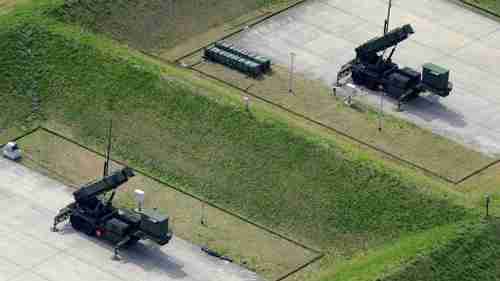 |
North Korea's shrill, belligerent threats continued on Tuesday, as the government warned all foreigners to leave the country immediately because of an approaching war. Nobody really has any clue what to expect from the North Koreans in the next few days, but the hope is that it won't be anything worse than a new missile test. Nonetheless, Japan is preparing for the worst, and is deploying Patriot anti-missile air defense units to defend against possible North Korean missile strikes. Japan has already deployed Aegis destroyers in the Sea of Japan to monitor the possible launch of North Korean ballistic missiles. Japan Times
A new report by the Organization for Economic Co-operation and Development (OECD) says that Slovenia faces an immediate banking crisis, with non-performing loans making up 14% of bank balance sheets in Slovenia, and that emergency action must be taken immediately. According to the report:
"Slovenia has been hit hard by a boom-bust cycle, compounded by reform backlogs and the euro area sovereign debt crisis. The reduction of public and private sector indebtedness is significantly weighing on growth amid tight financial conditions, growing unemployment and stalling export performance. Although important reforms have been adopted in 2012 and early 2013, additional and far-reaching reforms are needed as soon as possible to restore confidence and head off the risks of a prolonged downturn and constrained access to financial markets.Slovenia is facing a severe banking crisis, driven by excessive risk taking, weak corporate governance of state-owned banks and insufficiently effective supervision tools. ...
Potential growth has fallen significantly since the outset of the crisis. Boosting potential growth requires structural reforms, but the political economy of reform remains difficult, notably because it has been easy to use a referendum to veto a law. The ongoing discussion in Slovenia on ways to introduce stricter criteria on the use of referendums is hence welcome. Competition in the product market is not vibrant enough -- notably as state ownership is large and the Competition Authority has been lacking resources -- to facilitate economic adjustment. The labour market is not sufficiently flexible although an improvement is expected following the adoption of a recent reform aimed to reduce significantly labor market dualism."
So it sounds like Greece, Cyprus, and various other troubled countries. The state owns too many businesses and pays labor union members too much money, and has borrowed too much money to support government expenses. The OECD is demanding that banks and other public assets be sold off and privatized, a suggestion that's always been wildly popular in other troubled countries.
Slovenia's prime minister, Alenka Bratusek, denies that a bailout is required, saying that "The new government is determined to do everything in its power to solve its problems by itself." However, what she says is totally meaningless since, as we're all well aware, country leaders always lie repeatedly about needing a bailout, and always continue doing so until just a moment before they actually request a bailout. OECD and Guardian (London)
Six thousand individuals and legal entities withdrew tens of millions of euros in cash from Cyprus's banks and sent it abroad in the period from March 1-15, just days before the banks shut down and levied 60% or more on large deposits. The Parliament's Ethic Committee began an investigation, and demanded that the Cyprus central bank hand over a list detailing transfers of more than 100,000 euros for the past year, but the central bank failed to comply, according to an MP, Demetris Syllouris:
"It was with great disappointment and anger that, when we opened the envelope, we realized it contained data for only 15 days even though we had asked for a year. This kind of behavior is unacceptable."
Syllouris also raised concerns that even the 15 day list was incomplete. The economy in Cyprus continues to worsen after the bailout agreement, and the finger-pointing and name-calling are expected to become vicious. Reuters and Kathimerini (Athens)
 |
A donor conference meeting in Doha, Qatar, has pledged $3.6 billion over six years to finance the development of Darfur. The pledges include $500 million from Qatar, $35 million from the EU, $16.5 million from Britain, $1 million from Chad, and so forth. The pledges are, in my opinion, a total joke because the pledges from similar conferences in the past are almost always completely forgotten as soon as the conference ends.
Darfur is like a terminally ill patient, semi-conscious in bed, where he's being kept alive by dozens of tubes attached to his body, delivering and removing various fluids.
Darfur's civil war began as low-level violence in the 1970s as a fairly standard conflict between farmers and herders. What always happens is that the herders' animals trample on the farmers' crops, and then the farmers build fences to block the herders' animals. The violence worsened over the years, and the conflict transitioned to a generational crisis war in 2003, with the light-skinned "Arab" Janjaweed militia herders slaughtering the dark-skinned "non-Arab" farmers. That's when the United Nations "discovered" Darfur, and launched a donation-based program to protect the farmers from the herders. So the farmers were moved into huge refugee tent camps where they became entirely dependent on aid and donations from foreign entities. The financial crisis has reduced donations, and starvation is widespread in the Darfur refugee camps.
As I've been writing for years, a generational crisis war is an elemental force of nature, and has to reach a climax. At some point, the Janjaweed militias will return to finish the job, slaughtering the refugees like fish in a barrel. That will finally end the Darfur war. AFP
(Comments: For reader comments, questions and discussion, see the 10-Apr-13 World View -- Japan deploys anti-missile systems after North Korean threats thread of the Generational Dynamics forum. Comments may be
posted anonymously.)
(10-Apr-2013)
Permanent Link
Receive daily World View columns by e-mail
Donate to Generational Dynamics via PayPal
North Korea pulls its 53,000 workers out of industrial complex
This morning's key headlines from GenerationalDynamics.com
 |
For many days we heard analysts say that everything North Korea said was just bluster, because the Kaesong industrial park, the cooperative venture with South Korea, was still operating. But then the North Korean announced that South Korean workers would not be allowed to return. And now, on Monday, the North Koreans pulled out the 53,000 North Korean workers from Kaesong, effectively shutting it down.
No one knows what's going to happen next, though people are worried. A number of people have suggested that "something" is going to happen between April 10 and April 15, the latter date being the birthday of revered North Korean founder Kim Il-sung. A North Korean military attack on South Korea or on U.S. assets is a possibility, but is generally discounted. It appears that the most likely possibilities are a new nuclear weapon test, or a new missile test. CNN
Yesterday I wrote that Portugal would be the next eurozone bailout crisis, but Greece is right up there with Portugal. Greece is resuming negotiations with the "troika" of organizations bailing out Greece -- the European Commission (EC), the European Central Bank (ECB) and the International Monetary Fund (IMF). The main issue will be layoffs. There are some 4,000 civil servants who have been accused of breaking a code of conduct, and everyone agrees that they will be fired. But the troika wants more layoffs, and that's going to be a major contentious issue. These issues have to be resolved before the next 2.8 billion euro and 6 billion euro loan installments can be paid. Agreement was supposed to have been reached last month, but as usual, negotiations have been put off as long as possible. The real drop-dead date is May 20, when Greece has to pay 5.6 billion euros in payment for bonds that are set to expire. Kathimerini
A top-secret Greek report has been partially released to the press, and it comes to the conclusion that Germany owes Greece as much as 162 billion euros in World War II reparations. According to the report, "Greece never received any compensation, either for the loans it was forced to provide to Germany or for the damages it suffered during the war." That money would go a long way to relieving Greece's debt, allowing it to return to full wasteful spending mode for a couple of years before it gets into trouble again. However, Germany has no interest in revisiting the question of reparations to Greece, and Greek leaders are afraid to "pick a fight" with the country that's mostly responsible for approving or rejecting bailouts. However, the Greek public has a different view, and this report "has detonated like a bomb" among Greek people who are already inclined to refer to German Chancellor Angela Merkel as a Nazi. Spiegel
A deadly car bomb exploded in Damascus, Syria, on Monday, killing at 19 and injuring dozens more. The opposition rebel forces to the regime of president Bashar al-Assad have been attacking Damascus more frequently, as they've been increasingly successful in penetrating the regime's heavy security measures. In this case, rebel forces hid in buildings prior to the bomb attack, and fired at security forces when they arrived.
The bombing comes after the al-Assad regime has withdrawn large numbers of troops, up to 20,000, from Syria's Golan Heights, near the border with Syria, moving them to Damascus to provide greater security there. Israel fears that the vacuum along the border will be filled by jihadists who will use the area as a staging ground for attacks on Israel itself, and is building up its own forces on the border. Al-Jazeera and Guardian (London)
(Comments: For reader comments, questions and discussion, see the 9-Apr-13 World View -- Greece may demand 162 billion euros in WW II reparations from Germany thread of the Generational Dynamics forum. Comments may be
posted anonymously.)
(9-Apr-2013)
Permanent Link
Receive daily World View columns by e-mail
Donate to Generational Dynamics via PayPal
Portugal is about to be the next eurozone crisis
This morning's key headlines from GenerationalDynamics.com
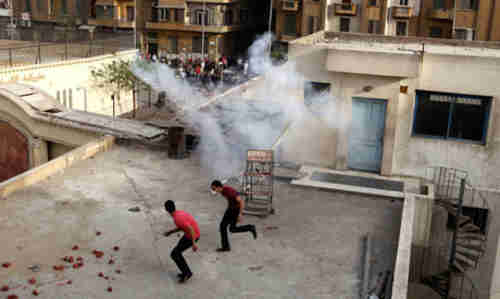 |
Seventeen people were injured on Sunday in clashes between Muslims and Coptic Christians after a funeral ceremony at a Coptic Orthodox cathedral near Cairo. The funerals were for four Christians who, along with one Muslim, were killed on Friday in some of the worst sectarian violence in months. Panic erupted on Sunday among angry Coptic men, armed with sticks and rocks, who rushed to an adjacent building from which rocks, and then firecrackers and Molotov coc,tails, were being thrown. Gunshots could also be heard. Copts are demanding military protection for the churches. Egypt's president Mohamed Morsi condemned the violence, and said, "I consider any attack on the cathedral an attack against myself." However, much of the anger expressed by both Copts and Muslims was directed at Morsi's Muslim Brotherhood. Al-Ahram (Cairo) and Al-Jazeera
The United States has been under international pressure to avoid "provoking" the fears and anxieties of the North Koreans, who have been getting increasingly bellicose each day. For this reason, the U.S. has decided to delay a long-planned missile test scheduled for next week, "to avoid any misperception or miscalculation." This comes just as South Korea's presidential office says that it expects the North Koreans to test-fire a missile around April 10, which is the date by which the North Koreans have asked that all personnel from foreign embassies in Pyongyang be evacuated.
North Korea's child dictator Kim Jong-un is sure to characterize the U.S. decision as a forced retreat by the Americans, who are afraid of an attack by the North Koreans.
Having said that, there's a possibility that this "victory" by the North Koreans will give them an opportunity to back down from further provocations, at least for a while. However, even in that optimistic scenario, the North Koreans will learn from this "victory" that they can do anything they want and get away with it. Reuters and Arirang (Seoul)
In a speech on Sunday, China's new president Xi Jinping gave a keynote address describing China's rise, emphasizing that China will always be at peace with its neighbors. He appeared to take a slap at the North Koreans:
"Second, we should work together to uphold peace so as to provide security safeguard for boosting common development. Peace is the ever-lasting wish of our people. Peace, like air and sunshine, is hardly noticed when people are benefiting from it. But none of us can live without it. Without peace, development is out of the question. Countries, whether big or small, strong or weak, rich or poor, should all contribute their share to maintaining and enhancing peace. Rather than undercutting each other's efforts, countries should complement each other and work for joint progress.The international community should advocate the vision of comprehensive security, common security and cooperative security so as to turn our global village into a big stage for common development, rather than an arena where gladiators fight each other.
And no one should be allowed to throw a region and even the whole world into chaos for selfish gains. With growing interaction among countries, it is inevitable that they encounter frictions here and there. What is important is that they should resolve differences through dialogue, consultation and peaceful negotiations in the larger interest of the sound growth of their relations."
The purposely ambiguous sentence about allowing no one to throw the world "into chaos" is thought to be a reference to North Korea, but that's far from clear, since Xi has made similar statements in its criticisms of the United States.
At any rate, the North Koreans are certainly not going to pay any attention. The North Koreans can ignore the Chinese for the same reason that American Democrats can ignore the blacks, and Republicans can ignore the evangelicals -- those groups have nowhere else to go.
In his inspirational homage to peace and harmony, Xi didn't bother to mention that China has been using its vast military power to bully, threaten and attack neighbors in order to gain control over vast regions of the South China Sea, including islands that historically belong to other nations. Shanghai Daily
Portugal's government is considering a plan to pay public workers and pensioners one month of their salary in treasury bills (a kind of IOU), rather than cash. The government was thrown into crisis on Friday when the Constitutional Court ruled that said cuts in the wages and pensions of public employees were unfair because they targeted only the public sector. The cuts were part of an austerity plan to cut 1.3 billion euros from the budget in 2013, in order to qualify to receive the next payment in its bailout loan from Europe and the IMF.
Portugal's prime minister Pedro Passos Coelho gave a somber televised speech to the nation on Sunday evening saying that the Constitutional Court decision is causing problems:
"After this decision by the Constitutional Court, it's not just the government's life that will become more difficult, it is the life of the Portuguese that will become more difficult and make the success of our national economic recovery more problematic. ... [The ruling] introduces uncertainty into a process that is already very demanding."
Now the government is going to be forced to find another way to cut 1.3 billion euros from the budget, or face losing the next bailout loan payment. And so, with the latest Cyprus bailout crisis easing into history, a new bailout crisis in Portugal is looming.
From the point of view of Generational Dynamics, there does not exist a solution to Europe's financial crisis, since the credit and real estate bubbles of the mid-2000s decade are still collapsing, and will continue to collapse into the 2020s. At some point, there will be a major global panic and financial crisis greater than what happened in 1929. Zero Hedge and AP
(Comments: For reader comments, questions and discussion, see the 8-Apr-13 World View -- Muslim vs Coptic Christian clashes in Egypt grow in intensity thread of the Generational Dynamics forum. Comments may be
posted anonymously.)
(8-Apr-2013)
Permanent Link
Receive daily World View columns by e-mail
Donate to Generational Dynamics via PayPal
Cuba's Fidel Castro warns North Korea not to start a war
This morning's key headlines from GenerationalDynamics.com
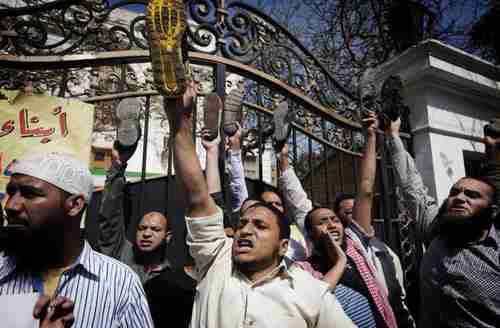 |
Sunni Muslim Egyptian protesters from the Salafist al-Nour party and other Salafist parties are launching campaigns against the steps taken by Muslim Brotherhood president Mohamed Morsi to reach a rapprochement with Shia Muslim Iran. The most frequent chants from the protesters were "Egypt will not become Shia, oh ambassador of Iran," and "Listen, Muslim Brotherhood, we do not want relations with Iran." The protesters are demanding that bilateral agreements between the two countries be revoked, and that Iranian tourism to Egypt be rejected. The Salafists are also planning to hold seminars to educate citizens about the "danger of Shias."
Sunni versus Shia enmity is increasing throughout the Mideast, especially propelled by the conflict in Syria. The new protests represent a new split between Egypt's two major Islamist groups, the "moderate" Muslim Brotherhood versus the Salafists. Tensions between these two groups have been growing anyway as Egypt's economy has tanked, but the anti-Shia protests are an important development.
From the point of view of Generational Dynamics, the Mideast is headed for a major regional war pitting Sunni Muslims against Shia Muslims and Jews against Arabs.
This story is interesting because it illustrates one of the techniques of Generational Dynamics forecasting. Most media would ignore this story as unimportant. But once you know from Generational Dynamics that the long-term trend is an increase in Sunni-Shia belligerence, eventually leading to all out war, then you know that a story about Sunni protesters against Shia rapprochement has the potential to be highly significant. Al-Bawaba (Jordan) and Egypt Independent
Cuba's former dictator Fidel Castro, now 86, is no longer the young revolutionary he once was, and appears to have mellowed, if we're to judge by his advice to another young dictator, Kim Jong-un of North Korea:
"Do not confuse the existence of intelligent life with the existence of life, from their elementary forms in our solar system emerged millions of years ago. ...This introduction would be too long if it was not to explain the severity of an event so incredible and absurd as is the situation created in the Korean peninsula, in an area where there are nearly 5 billion of 7 billion people that currently inhabit the planet. ...
I was honored to meet Kim Il Sung, a historical figure, remarkably brave and revolutionary.
If war breaks out there, people on both sides of the Peninsula will be terribly slaughtered, with no benefit to any of them. The Republic of Korea was always friendly with Cuba, and Cuba has always been and will remain with it.
Now that has demonstrated its technical and scientific progress, we remind her duties with the countries that have been his great friends, and it would be unfair to forget that such special way war would affect more than 70% of the planet's population.
If there is a conflict erupted such, the Government of Barack Obama in his second term would be buried by a deluge of images that would present the most sinister character in American history. The duty to avoid this is also his and the American people."
Apparently Castro's remarks have made no impression on North Korea's child dictator, as he continues to threaten war and paint himself into a corner. Granma (Havana) (Trans)
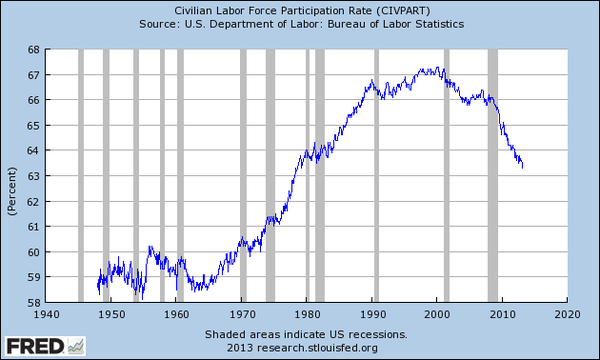 |
Friday's disastrous jobs report showed that only 88,000 jobs were created in March, well below the several hundred thousand that are needed just to keep up with population growth. At the same time, the unemployment rate fell slightly. The explanation for these seemingly conflicting stats is that some 500,000 people left the workforce -- and not just retiring Boomers either. Over 3/4 of those leaving the work force were under age 55, indicating that a lot of people are simply giving up the search for work.
The interesting issue is how to interpret that above graph, which shows the Labor Participation Rate since the end of World War II. Here is my explanation:
Today there are many new impediments to hiring -- ObamaCare and the sequester, in particular. Reuters and St. Louis Fed
(Comments: For reader comments, questions and discussion, see the 7-Apr-13 World View -- Egyptian protesters demand end to ties with Iran and 'Shia Islam' thread of the Generational Dynamics forum. Comments may be
posted anonymously.)
(7-Apr-2013)
Permanent Link
Receive daily World View columns by e-mail
Donate to Generational Dynamics via PayPal
North Korea warns embassies to evacuate before April 10
This morning's key headlines from GenerationalDynamics.com
 |
Chinese authorities have slaughtered over 20,000 chickens, ducks, geese and pigeons form a live poultry market in Shanghai, as evidence mounts that a new H7N9 bird flu virus has evolved into a form that can spread from bird to mammal, and from mammal to mammal. China has confirmed 14 H7N9 cases, of whom six have died. The current form of the virus is not considered dangerous, because it spreads to a human only in case of physical contact with an infected bird or human. But pandemic concerns are rising because the virus is evolving, and the next mutation may bring it to a form that can spread rapidly from human to human. The mutations permit the virus to function in the lower body temperators of mammals, as opposed to the higher body temperatures of birds. There are now suspicions that the thousands of dead pigs found in the rivers near Shanghai died of the same flu virus. 20-40 million people died during the 1918-1919 Spanish Flu epidemic, considered the most devastating global epidemic in recorded world history. Xinhua and Recombinomics
The European financial crisis has pushed the popularity of France's Socialist president Francois Hollande to the lowest in decades. Hollande had promised to raise taxes on the rich and fight corruption, but his campaign was completely derailed this week when his own budget minister Jerome Cahuzac was forced to admit that he had a secret offshore 600,000 euro bank account, and that he'd been lying about it for years. According to one analyst:
"This weakens Hollande. It goes to the heart of the austerity debate. For the hard left, the charge will be that the Socialists are hypocritical: during the day they talk social justice, but at night they’re managing their Swiss bank accounts and shares on Wall Street."
Unfortunately, there are a lot of politicians with similar ethics, and they're not all Socialists. Bloomberg
North Korea on Friday has advised all embassies in Pyongyang, the capital city, to evacuate their staff by April 10, saying that their safety could be at risk in the event of a conflict after that date. Also, North Korea loaded two intermediate-range missiles onto mobile launchers and hid them in an unidentified facility near the east coast, triggering speculation that the North is ready for an abrupt missile launch. These missiles would not be able to reach the U.S. mainland, but they could reach Japan, South Korea, and Guam. South Korea has responded by sending its destroyer warships to positions near North Korean waters, equipped with Aegis systems capable of shooting down missiles. ABC News and Yonhap (Seoul)
(Comments: For reader comments, questions and discussion, see the 6-Apr-13 World View -- Pandemic concerns rising over China's H7N9 bird flu deaths thread of the Generational Dynamics forum. Comments may be
posted anonymously.)
(6-Apr-2013)
Permanent Link
Receive daily World View columns by e-mail
Donate to Generational Dynamics via PayPal
Intercepted communications suggest North Korea near missile launch
This morning's key headlines from GenerationalDynamics.com
 |
Just outside the town center of Meiktila, Burma (Myanmar), there's a blackened patch of ground where 20 Muslim boys last month were taken from a madrassa, and hacked to death, their bodies soaked in petrol and set alight. This was part of a much larger wild, frenzied attack by Buddhists on Muslims that killed dozens and reduced an entire established community of 12,000 Muslims, including homes, shops and mosques, to ashes and rubble. According to a former army captain who witnessed the events:
"I saw eight boys killed in front of me. I tried to stop the crowd, I told them to go home. But they threatened me, and the police pulled me away.The police did not do anything - I don't know why. Perhaps because they lack experience, perhaps because they did not know what orders to give.
On the bank thousands of people were cheering. When someone was killed, they cheered. And they were shouting 'they killed our monk yesterday, we must kill them'. There were women, monks, young people. I feel disgusted - and ashamed."
This description reminded me of descriptions of Kristallnacht that I've quoted in the past. According to Martin Gilbert, in his 2006 book "Kristallnacht, Prelude to Destruction":
"Jewish communities in Germany dated back a thousand years. For the fifty years before Hitler came to power, German Jews had integrated fully into German life and culture. They were proud Germans, bewildered to be singled out as an evil influence, and trusting that the excesses of Nazism must, in the normal evolution of things, moderate and decline."
Gilbert quotes the Daily Telegraph Berlin correspondent of the time as follows:
 |
"Racial hatred and hysteria seemed to have taken complete control of otherwise decent people. I saw fashionably dressed women clapping their hands and screaming with glee, while respectable middle-class mothers held up their babies to see the 'fun.'"
Buddhist monk Ashin Wirathu is a major anti-Muslim activist leader in Burma. He says the following:
"We Buddhist Burmese are too soft. We lack patriotic pride.They - the Muslims - are good at business, they control transport, construction. Now they are taking over our political parties. If this goes on, we will end up like Afghanistan or Indonesia. ...
When you leave a seed, from a tree, to grow in a pagoda, it seems so small at first. But you know you must cut it out, before it grows and destroys the building."
Change just a few of the names, and this quote by Ashin Wirathu could have come directly out of Adolf Hitler's mouth. BBC
Student loans are unique in that they can't be discharged in a bankruptcy. The result is that borrowers have no leverage, and are subject to all kinds of abuse by collection agencies, including extremely high interest rates. Delinquency rates for student debt have been increasing. Outstanding student debt was $250 billion in 2003, now about $1 trillion, and continuing to grow exponentially, creating a student loan credit bubble that could collapse and damage the economy in the same way that the collapse of the real estate bubble damaged the economy. Main Street and CBS News and Bloomberg
North Korea has moved a mobile medium range missile and associated launch components to the east coast in the last few days, putting Japan, South Korea and Guam within possible target range. The missile could be fired immediately, if desired. In addition, U.S. officials say that intercepted communications seem to show that the North Koreans are planning a mobile ballistic missile launch in the coming days or weeks. CNN
(Comments: For reader comments, questions and discussion, see the 5-Apr-13 World View -- Meiktila, Burma, violence has echoes of Kristallnacht thread of the Generational Dynamics forum. Comments may be
posted anonymously.)
(5-Apr-2013)
Permanent Link
Receive daily World View columns by e-mail
Donate to Generational Dynamics via PayPal
Hugo Chavez returns to Venezuela reincarnated as a singing bird
This morning's key headlines from GenerationalDynamics.com
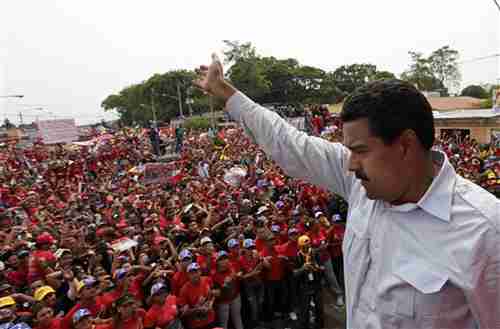 |
A month after the March 5 death of Venezuela's president Hugo Chavez of cancer, Acting President Nicolas Maduro kicked off his campaign for the presidency with a speech about how he had a singing duet with a bird who was the reincarnation of Chavez:
"A bird was looking at me and it started singing. It sang and I responded with a song. The bird took flight, circled around once then flew away.I felt the spirit and the blessings of Hugo Chavez for this battle that begins today -- towards victory on April 14!"
There have been no reports of help from the beyond for opposition candidate Henrique Capriles. Euro news
In response to the North Korean threats of a missile attack on United States' possessions, the Pentagon has announced that it's moving an advanced missile defense system to Guam to protect that U.S. bases on that island. The system is the ballistic Terminal High Altitude Area Defense System (Thaad), which includes a truck-mounted launcher, interceptor missiles, and AN/TPY-2 tracking radar, together with an integrated fire control system.
In response, the official North Korean news agency issued a statement:
"We formally inform the White House and Pentagon that the ever-escalating US hostile policy towards the DPRK [North Korea] and its reckless nuclear threat will be smashed by the strong will of all the united service personnel and people and cutting-edge smaller, lighter and diversified nuclear strike means of the DPRK and that the merciless operation of its revolutionary armed forces in this regard has been finally examined and ratified."
For several days, pundits have been saying that the war threats from North Korea don't really mean anything because the Kaesong industrial park was still operating. The Kaesong industrial park is in North Korea, just across the border from South Korea. It was created in 2004 as a point of cooperation between the two Koreas. It provides jobs for more than 50,000 North Koreans, and over 1,000 South Koreans, many of whom cross the border each day to work there. The employers are South Korean manufacturing firms, mostly textiles. The salaries of the North Koreans get paid to the North Korean government, which then pays a tiny fraction of the amount to the actual person who did all the work. So it's a highly lucrative situation for the North Korean government.
On Wednesday, North Korea barred South Korean workers from entering Kaesong industrial park. South Korean workers will be allowed to return South, but many are staying in Kaesong out of fear that they won't be able to return. South Korean firms with workers at Kaesong are expressing concern that they won't be able to send food to their workers.
South Koreans are quite indifferent to the North Korean threats, according to reports, and are just going about their normal business with no concerns. This is contrast to the alarms being expressed in the Western media.
So you can take your pick on what to believe. You can believe that North Korean child dictator Kim Jong-un is just throwing a childish temper tantrum, and that eventually he'll tire of it, and just settle down and take a nap.
Or, you can take the view that Kim Jong-un has gone so far over the line in making hysterical threats, that backing down would completely destroy his credibility, at home and abroad, and that therefore he MUST conduct some sort of military strike. We report, you decide. Globe and Mail (Canada) and Hankyoreh Media (Seoul)
Protesters marched through Cairo on Wednesday to express their rejection of the austerity requirements of any IMF loan to Egypt. The protests come as IMF visitors arrived in Cairo for a brutal ten days of negotiations with Egyptian leaders for a $4.8 billion, at a time when Egypt's foreign currency reserves are desperately low and the pound currency is falling in value. It is now almost impossible for Egypt to buy wheat, of which it is the world's biggest importer, and fuel. The IMF and Egypt have reached loan agreements twice in the past, but Egypt walked away from them because of political protests against the IMF's austerity rules. But Egypt's economic situation has become so desperate that president Mohamed Morsi may have to risk further unpopularity by signing the deal with the IMF. Al-Ahram (Cairo) and Reuters
(Comments: For reader comments, questions and discussion, see the 4-Apr-13 World View -- U.S. moves defense missiles to Guam for North Korean threats thread of the Generational Dynamics forum. Comments may be
posted anonymously.)
(4-Apr-2013)
Permanent Link
Receive daily World View columns by e-mail
Donate to Generational Dynamics via PayPal
Eurozone unemployment rises to record high 12%
This morning's key headlines from GenerationalDynamics.com
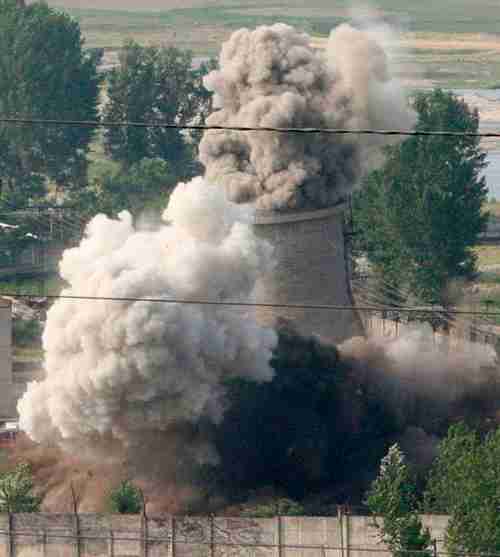 |
North Korea announced on Tuesday that it would be restarting its nuclear facilities at Nyongbyon, including the plutonium reactor and a uranium enrichment plant which produce fuel for nuclear weapons. In 2007, the North Koreans agreed to shut the plant down, in return for economic aid. In 2008, the North Koreans demolished the cooling tower in a spectacular explosion. The new announcement signals the failure of pretty much the only success in negotiating with North Korea in the last decade. AP
The process of ping-pong belligerence continued to grow as threats of war on the Korean Peninsula have caused China to place its military forces on heightened alert. China's People’s Liberation Army (PLA) is mobilizing troops near the border with North Korea, including troop movements and warplane activity. China’s navy warships have also been conducting live-firing naval drills in the Yellow Sea.
This comes a week after North Korea announced that since March 26 its missile and artillery forces have been placed on the highest alert status.
It's not completely clear whether China's mobilization is for the defense of China from attacks by North Korea, for the defense of North Korea from attacks by the U.S. and South Korea, for the defense of China from attacks by the U.S., or for all of the above.
The United States has moved a destroyer capable of shooting down missiles to the waters off the coast of Korea. Over the weekend, the U.S. flew two B-2 stealth bombers round trip from Missouri to Korea, where dummy bombs were dropped. Many people consider these actions to be warnings to both North Korea and China that the U.S. is capable of delivering nuclear weapons quickly, even without use of aircraft carriers.
This kind of ping-pong belligerence in a generational Crisis era is exactly the kind of thing that triggers generational crisis wars. Pundits are expressing the hope the N. Korea's child dictator Kim Jong-un will back down, allowing the U.S. and China to back down, and certainly China and his own advisors are pressuring him to do just that. But he may have gone so far out on a limb that backing down now will put his entire dictatorship into danger. Russia Today and Free Beacon
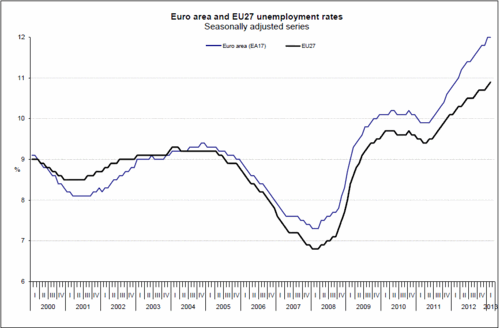 |
The unemployment rate rose to a eurozone all-time high of 12% in February, up from 10.9% in February of last year. The huge divergences within the eurozone were illustrated by youth unemployment, which ranged from 55.7% in Greece to 7.7% in Germany. Compared to a year ago, the highest increases occurred in Greece, Portugal and Spain, while the largest decreases occurred in Latvia, Estonia, and Ireland.
As bad as the figures are, the worse news is that this is a long-term trend that's continuing. For several years, we've been hearing that Europe's economy would start growing again -- in 2008, in 2009, in 2010, in 2011, in 2012. All of the "kicking the can down the road" European crises, especially in Greece, were based on the assumption that if you can stall long enough, then the economy will start growing again, and everyone can start spending money and going into even higher debt -- a truly ridiculous assumption, since it assumes that the credit bubble will resume. Even now I hear some analysts talk about growth in the second half of 2013, or in 2014. But the Boomers and Gen-Xers who caused the huge credit bubble of the early 2000s have been badly burned by their personal and business debt. This is what happened in the 1930s, after the crash of 1929, and why the stock market didn't return to pre-crash levels for 25 years. In fact, from the point of view of Generational Dynamics, we haven't even seen the worst yet, because we will see, with absolutely certainty, a historic crash that will be remembered forever, just as the crash of 1929 is indelibly burned into generational memory. Bloomberg and eurostat (PDF)
(Comments: For reader comments, questions and discussion, see the 3-Apr-13 World View -- China's military on high alert near North Korean border thread of the Generational Dynamics forum. Comments may be
posted anonymously.)
(3-Apr-2013)
Permanent Link
Receive daily World View columns by e-mail
Donate to Generational Dynamics via PayPal
David Stockman says our economy is in 'End-stage metastasis'
This morning's key headlines from GenerationalDynamics.com
We've reported on the massive violent attacks against Muslims by rampaging mobs of Buddhists around Meiktila, Burma (Myanmar), during March 20-22, killing dozens, displacing thousands, destroying hundreds of residences and mosques. The extent of the devastation is shown dramatically by the following before and after pictures:
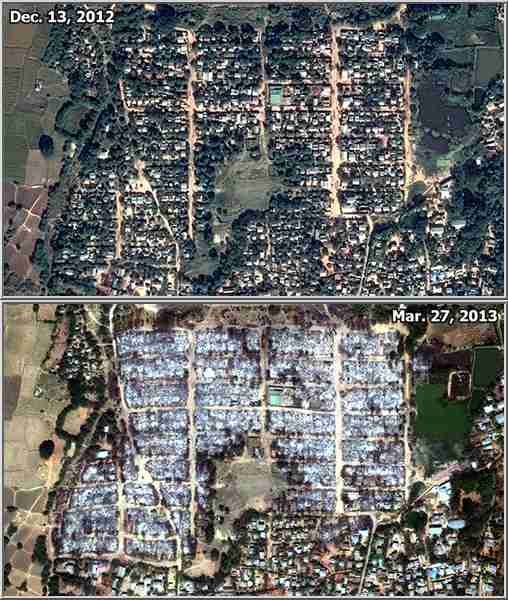 |
The damage covers a region of about 24 hectares (60 acres). Buddhist violence against Muslims appears to be increasing in Burma and in Sri Lanka, and possibly other Asian regions as well. Human Rights Watch
North Korea has continued increasingly belligerent statements, going far beyond the tenor of previous statements, even declaring that North and South Korea are already in a state of war. North Korea's child dictator, Kim Jong-un, has gone so far that it may be impossible to back down without losing substantial credibility domestically, and so he may decide that it's necessary to prove himself by making some attack, like the two attacks on South Korea in 2010. As things stand now, tensions are very high in both North and South Korea, and both sides have made it clear that they strike militarily at the slightest provocation.
U.S. defense officials are confirming that the Navy has moved the destroyer USS McCain to a location off the coast of the Korean Peninsula. The destroyer is equipped with the Aegis defense system that's capable of shooting down missiles.
From the point of view of generational theory, this ping-pong back and forth of threats and counter-threats is exactly the pattern that leads to generational crisis wars. Fox News and VOA
Two kinds of extremist groups -- Islamist extremists and far-right neo-Nazi extremists -- are growing in strength and influence in the Balkans, albeit slowly. (The phrase "far-right" has different meanings in Europe and America.) The Arab Spring has inspired the rise of several Islamic extremist organizations in Kosovo, Albania and Serbia. However, the huge international presence in the Balkans has denied them the basis for widespread violence, nor have they been able to convince citizens that they are focused on solving problems, not just selling nationalist rhetoric. Far-right extremists in the Balkans region have been similarly unsuccessful, with the notable exception of the neo-Nazi Golden Dawn in Greece, which holds 18 seats in parliament, and whose popularity is rising. Southeast Europe Times
President Ronald Reagan took his budget director, David A. Stockman, "to the woodshed" for calling supply-side economics a "Trojan horse" that would simply benefit the rich. Stockman has been critical of economic policies in all administrations since then, and now he's saying that economic policy failures -- a bloated government economy mired deeply in debt -- have compounded themselves to the point where America is in "End-stage metastasis," headed for a new Great Depression. According to Stockman:
"The future is bleak. The greatest construction boom in recorded history — China’s money dump on infrastructure over the last 15 years — is slowing. Brazil, India, Russia, Turkey, South Africa and all the other growing middle-income nations cannot make up for the shortfall in demand. The American machinery of monetary and fiscal stimulus has reached its limits. Japan is sinking into old-age bankruptcy and Europe into welfare-state senescence. The new rulers enthroned in Beijing last year know that after two decades of wild lending, speculation and building, even they will face a day of reckoning, too. ...These policies have brought America to an end-stage metastasis. The way out would be so radical it can’t happen. It would necessitate a sweeping divorce of the state and the market economy. It would require a renunciation of crony capitalism and its first cousin: Keynesian economics in all its forms. The state would need to get out of the business of imperial hubris, economic uplift and social insurance and shift its focus to managing and financing an effective, affordable, means-tested safety net. ...
The United States is broke — fiscally, morally, intellectually — and the Fed has incited a global currency war (Japan just signed up, the Brazilians and Chinese are angry, and the German-dominated euro zone is crumbling) that will soon overwhelm it. When the latest bubble pops, there will be nothing to stop the collapse. If this sounds like advice to get out of the markets and hide out in cash, it is."
A different view of the situation, reaching the same conclusion, is provided by analyst Mark D. Cook:
"I believe when the 1st quarter of 2013 is looked upon in a rear view mirror, it will go down as one of the most overextended, overbought markets of all time. Keep in mind that the complacency factors that I view have the bulls not seeing the semi bearing down on them to flatten. A pullback of 200 to 300 S&P points from this point to sometime in 2013 appears likely given the overextension. I feel like the person that knows the earthquake is going to consume all the terrain, but nobody is listening as they sip marguerites and purchase extravagances beyond normal common sense. Human nature will never change."
I guess he feels like me.
Generational Dynamics approaches the issues in a different way, but reaches the same conclusions. Both Europe and America are in a deflationary spiral, and a major financial panic and crisis, worse than 1929, is coming with mathematical certainty. (NY Times) and UPI (April 13, 1986) and Mark D Cook
(Comments: For reader comments, questions and discussion, see the 2-Apr-13 World View -- U.S. Navy moves destroyer off coast of Korean Peninsula thread of the Generational Dynamics forum. Comments may be
posted anonymously.)
(2-Apr-2013)
Permanent Link
Receive daily World View columns by e-mail
Donate to Generational Dynamics via PayPal
Jordan and Palestine agree to jointly defend Jerusalem from Israel
This morning's key headlines from GenerationalDynamics.com
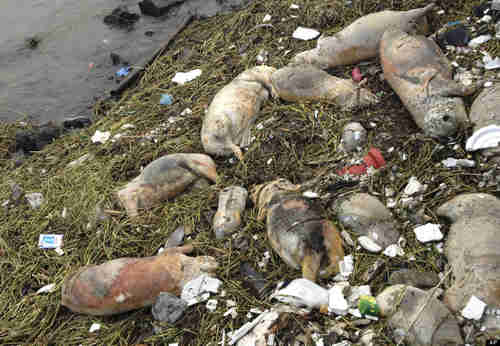 |
From a country of 1.3 billion people and fraught with water shortages, comes a startling new census report that over half the nation's rivers have disappeared. According to the Ministry of Water Resources, China currently has 22,909 rivers, some 28,000 fewer than in the 1990s. The drastic drop is blamed on faulty maps, severe overexploitation of groundwater in 400 cities in China, and severe pollution.
This comes just after a series of "animal apocalypse" stories, one after another. First, over 16,000 pig carcasses were found in one of the rivers supplying the water supply of Shanghai, China's financial hub, starting last month. Then more than 1,000 dead ducks were found in a river in southwest China. And what's just as amazing is that Chinese authorities are offering no explanation for these carcasses, except to say that they're "investigating."
And now a new story is coming out of Anhui province in eastern China, about a scenic pond inhabited by a bevy of beautiful black swans for the the last decade. All of a sudden, five of the black swans were found dead on Wednesday morning. Once again, there's no official explanation, but a reporter found that the water had an oily quality to it, and quite a lot of garbage could be seen on the surface. Many people often used the pond to rinse cloths, mops, mats and other items containing various chemicals. Global Times and Shanghaiist and Danwei
Germany's Finance Minister Wolfgang Schäuble is insisting that bank savings deposits are safe in all eurozone countries besides Cyprus are safe:
"Cyprus is and will remain a special one-off case. The savings accounts in Europe are safe.Cyprus’s economy will now go through a long and painful period of adjustment. But then it will pay back the loan when it is on a solid economic foundation. ...
[You] could see [the strength of the euro] during the Cyprus crisis. The entire turbulence did not have any impact on the other countries in southern Europe. The financial markets have seen: we are better prepared now. We’ve accomplished quite a bit.
What is more important is that we are strong enough to keep everyone in the boat.
I believe that we will one day read in the history books about this period that the crisis brought Europe even closer together."
He added that the continent was currently enjoying "a very fortunate era."
Schäuble was trying to reassure the wider European public, many of whom fear the power of the Germans, and see them as imposing the German culture on the rest of Europe by force. The Germans are deeply angered by portrayals in Cyprus of Chancellor Angela Merkel with a Hitler moustache.
At the same time, Schäuble was addressing the domestic German audience, which is headed for federal elections in September. The Germans are relieved, comforted and pleased with themselves, because the Germans didn't have pay to bail out the Russian oligarchs.
That's why few people really believe that Schäuble was telling the truth. Everybody knows that Greece is headed for another crisis, as are Spain, Portugal and Italy. What will happen then? Will Germany really be willing to bear the brunt of another bailout, without taking advantage of "the Cyprus solution" -- taxing the depositors' savings accounts? If you believe that, then I have a bridge I'd like to sell you.
Even most Germans don't believe that their savings are necessarily safe, with one in three saying they'd like to return to the deutschmark. And there's growing anecdotal evidence that some Germans have begun removing their savings from banks, and that others have opened new accounts to spread their savings around and avoid getting caught like Cypriot depositors with more than 100,000 euros. Spreading savings around several banks may not be a bad idea for large American savers, as well.
As I've been saying for years, from the point of view of Generational Dynamics, both Europe and America are in a deflationary spiral, and a major financial panic and crisis, worse than 1929, is coming with mathematical certainty. VOA and Kathimerini and Guardian (London)
Various bloggers are digging into the math behind the Cyprus bailout, and are finding that the figures don't make sense. It was originally reported that Russian oligarchs had over 35 billion euros in Cyprus banks, but it now appears that it's really more like 10 billion. We've been told that the immediate cause of the problem was all the foreign money in the banking system, but that explanation now appears to be wrong. Forbes
On Sunday, Palestinian Authority President Mahmoud Abbas and Jordan's King Abdullah signed an agreement on "the defense of Jerusalem and the holy sites."
According to the agreement:
Jerusalem Post and Petra (Jordan)
(Comments: For reader comments, questions and discussion, see the 1-Apr-13 World View -- Half of China's rivers have disappeared thread of the Generational Dynamics forum. Comments may be
posted anonymously.)
(1-Apr-2013)
Permanent Link
Receive daily World View columns by e-mail
Donate to Generational Dynamics via PayPal
Web Log Summary - 2016
Web Log Summary - 2015
Web Log Summary - 2014
Web Log Summary - 2013
Web Log Summary - 2012
Web Log Summary - 2011
Web Log Summary - 2010
Web Log Summary - 2009
Web Log Summary - 2008
Web Log Summary - 2007
Web Log Summary - 2006
Web Log Summary - 2005
Web Log Summary - 2004
Web Log - December, 2016
Web Log - November, 2016
Web Log - October, 2016
Web Log - September, 2016
Web Log - August, 2016
Web Log - July, 2016
Web Log - June, 2016
Web Log - May, 2016
Web Log - April, 2016
Web Log - March, 2016
Web Log - February, 2016
Web Log - January, 2016
Web Log - December, 2015
Web Log - November, 2015
Web Log - October, 2015
Web Log - September, 2015
Web Log - August, 2015
Web Log - July, 2015
Web Log - June, 2015
Web Log - May, 2015
Web Log - April, 2015
Web Log - March, 2015
Web Log - February, 2015
Web Log - January, 2015
Web Log - December, 2014
Web Log - November, 2014
Web Log - October, 2014
Web Log - September, 2014
Web Log - August, 2014
Web Log - July, 2014
Web Log - June, 2014
Web Log - May, 2014
Web Log - April, 2014
Web Log - March, 2014
Web Log - February, 2014
Web Log - January, 2014
Web Log - December, 2013
Web Log - November, 2013
Web Log - October, 2013
Web Log - September, 2013
Web Log - August, 2013
Web Log - July, 2013
Web Log - June, 2013
Web Log - May, 2013
Web Log - April, 2013
Web Log - March, 2013
Web Log - February, 2013
Web Log - January, 2013
Web Log - December, 2012
Web Log - November, 2012
Web Log - October, 2012
Web Log - September, 2012
Web Log - August, 2012
Web Log - July, 2012
Web Log - June, 2012
Web Log - May, 2012
Web Log - April, 2012
Web Log - March, 2012
Web Log - February, 2012
Web Log - January, 2012
Web Log - December, 2011
Web Log - November, 2011
Web Log - October, 2011
Web Log - September, 2011
Web Log - August, 2011
Web Log - July, 2011
Web Log - June, 2011
Web Log - May, 2011
Web Log - April, 2011
Web Log - March, 2011
Web Log - February, 2011
Web Log - January, 2011
Web Log - December, 2010
Web Log - November, 2010
Web Log - October, 2010
Web Log - September, 2010
Web Log - August, 2010
Web Log - July, 2010
Web Log - June, 2010
Web Log - May, 2010
Web Log - April, 2010
Web Log - March, 2010
Web Log - February, 2010
Web Log - January, 2010
Web Log - December, 2009
Web Log - November, 2009
Web Log - October, 2009
Web Log - September, 2009
Web Log - August, 2009
Web Log - July, 2009
Web Log - June, 2009
Web Log - May, 2009
Web Log - April, 2009
Web Log - March, 2009
Web Log - February, 2009
Web Log - January, 2009
Web Log - December, 2008
Web Log - November, 2008
Web Log - October, 2008
Web Log - September, 2008
Web Log - August, 2008
Web Log - July, 2008
Web Log - June, 2008
Web Log - May, 2008
Web Log - April, 2008
Web Log - March, 2008
Web Log - February, 2008
Web Log - January, 2008
Web Log - December, 2007
Web Log - November, 2007
Web Log - October, 2007
Web Log - September, 2007
Web Log - August, 2007
Web Log - July, 2007
Web Log - June, 2007
Web Log - May, 2007
Web Log - April, 2007
Web Log - March, 2007
Web Log - February, 2007
Web Log - January, 2007
Web Log - December, 2006
Web Log - November, 2006
Web Log - October, 2006
Web Log - September, 2006
Web Log - August, 2006
Web Log - July, 2006
Web Log - June, 2006
Web Log - May, 2006
Web Log - April, 2006
Web Log - March, 2006
Web Log - February, 2006
Web Log - January, 2006
Web Log - December, 2005
Web Log - November, 2005
Web Log - October, 2005
Web Log - September, 2005
Web Log - August, 2005
Web Log - July, 2005
Web Log - June, 2005
Web Log - May, 2005
Web Log - April, 2005
Web Log - March, 2005
Web Log - February, 2005
Web Log - January, 2005
Web Log - December, 2004
Web Log - November, 2004
Web Log - October, 2004
Web Log - September, 2004
Web Log - August, 2004
Web Log - July, 2004
Web Log - June, 2004